Here’s our look at the Trump administration and the rest of Washington:
- After the attack in New York that killed 8, Trump calls for merit-based immigration
- Trump spokeswoman dismisses Russia-related indictments: “Nothing to do with” the president
- Special counsel’s inquiry yields first guilty plea, from former Trump aide who lied to the FBI
- Paul Manafort and another Trump campaign aide indicted; Manafort’s bond is $10 million
- Share via
Virginia tests a likely 2018 election strategy: racially fraught appeals
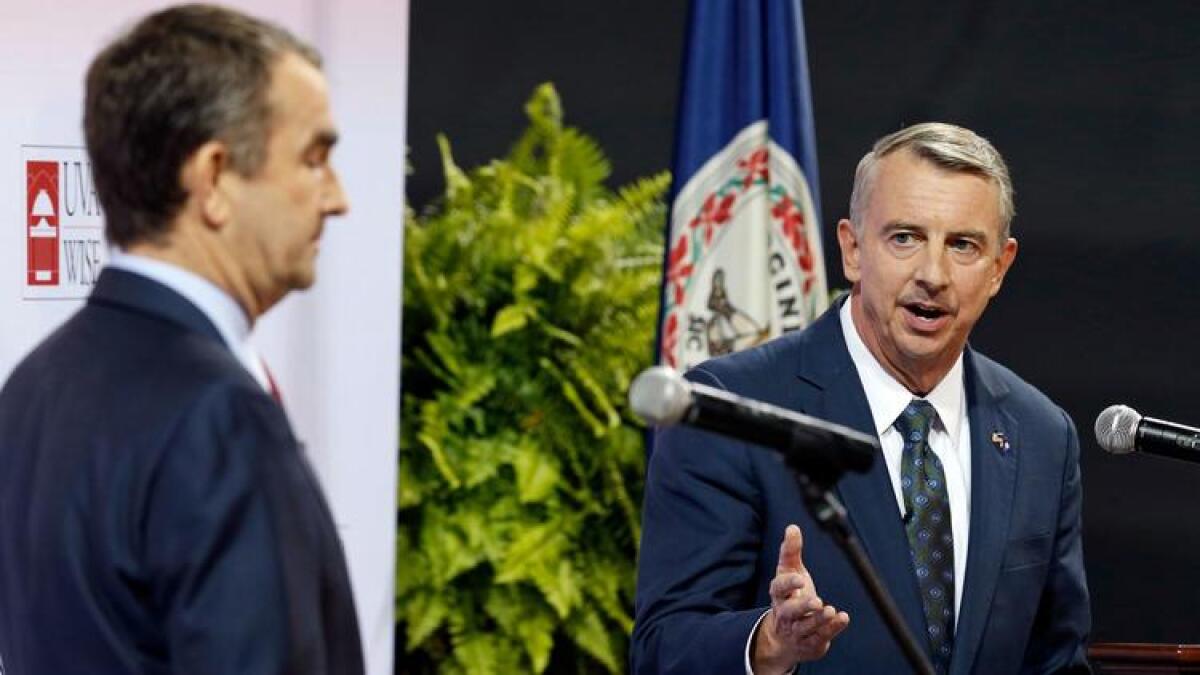
Virginia has been swamped by fearful images as Tuesday’s state elections near: heavily tattooed and handcuffed Latinos staring balefully at the television camera, a mug shot of a convicted pedophile set loose on the state.
Versions of those ads may be headed to other states in the 2018 elections, as Republicans seek to maximize the turnout of the burgeoning Trump wing of the party with themes known to appeal to them.
The strategy in Virginia by Republican gubernatorial candidate Ed Gillespie has played heavily on themes of race and crime — itself an issue that has historically conjured racial stereotypes — in the style employed by President Trump last year.
Both sides believe the outcome likely will turn on which candidate — Gillespie or Democrat Ralph Northam — can best deploy their base voters on Nov. 7. Democrats, who have won statewide in elections since 2009, are counting on Trump’s unpopularity to pull their voters to the polls. Republicans have sought to energize their voters with issues including gangs, sanctuary cities and Confederate monuments.
- Share via
Trump seizes on New York attack to sell immigration agenda, rile his political rival
President Trump quickly seized on Tuesday’s deadly attack in New York to promote immigration restrictions and to criticize his chief Democratic rival, New York Sen. Charles E. Schumer.
Trump’s immediate labeling of the attack as a terrorist act and his calls for policy actions contrasted with his responses to the violence and a killing by white supremacists in Charlottesville, Va., in August — Trump wouldn’t blame the neo-Nazis solely and said then he doesn’t rush to discuss incidents without the facts — and to the mass killings in Las Vegas on Oct. 1, after which he said it was too soon to discuss gun laws.
Trump’s Wednesday morning tweets followed a report from ABC News that the man apprehended in the New York attack, Sayfullo Saipov, came to the United States in 2010 through the diversity lottery program, which is designed to increase legal immigration from countries with lower numbers of migrants.
Trump is trying to end the program and many conservative outlets have seized on Tuesday’s attacks to criticize the program and Schumer.
Two of Trump’s Wednesday tweets referenced Fox News, an indication he was probably watching the cable news channel, his routine in the morning.
He first tweeted on Tuesday night, soon after the incident, saying he “ordered Homeland Security to step up our already Extreme Vetting Program,” the subject of extensive litigation since Trump took office. Trump did not offer specifics and it is unclear how different vetting procedures would have affected Saipov’s case.
Schumer responded on Twitter hours later:
- Share via
House GOP tax plan will keep top 39.6% tax rate for rich, delay estate tax repeal for 2-3 years
The much-anticipated House GOP tax plan will keep the current top tax rate of 39.6% for the most affluent Americans but will make that bracket apply only to “substantially” higher incomes than the current $470,700 for couples, House Speaker Paul D. Ryan told a group of conservative interest groups Tuesday.
The plan will also delay any repeal of the estate tax for two to three years, the speaker told the group, according to participants in the private meeting.
Ryan said he wanted the House bill to immediately cut the corporate tax rate to 20% from the current 35%, but he acknowledged that the final version may be different. “I can’t speak to what the Senate’s going to do,” he told the group.
House leaders have been planning to introduce their bill on Wednesday, but GOP leaders indicated that may slip to Thursday amid continued negotiations over some parts of the measure.
Some Republicans are urging a gradual phase-down of the corporate rate as a way to reduce the costs of the sweeping GOP tax-cut package. In order to pass in the Senate, the tax plan may not add more than $1.5 trillion to the deficit over 10 years.
Many attendees were initially disappointed with the preservation of the top rate, but became more at ease as Ryan disclosed additional details, according to the person inside the room.
Other key elements remain under discussion, including how to limit state and local deductions and whether to impose caps on tax-deferred 401(k) retirement accounts.
- Share via
Trump won’t make a ‘cliche’ visit to DMZ during trip to South Korea, White House says
President Trump won’t be going to the demilitarized zone on the border between North and South Korea during his 12-day tour of Asia, the White House confirmed on Tuesday.
“The president is not going to visit the DMZ. There is not enough time in the schedule,” said a senior administration official, who insisted on anonymity to brief reporters on the Asia trip.
Trump leaves on Friday and will stop first in Hawaii before visiting five Asian countries — Japan, South Korea, China, Vietnam and the Philippines — at a time when tensions with North Korea have spiked over its advancing nuclear missile program and its threats to conduct an above-ground nuclear test. Those tensions were said to be a factor in the decision for Trump to skip a visit.
Defense Secretary James N. Mattis, Secretary of State Rex Tillerson and Vice President Mike Pence have all visited the DMZ, a 2.5-mile wide strip of land that has separated the two countries since 1953.
“It’s becoming a little bit of a cliché” for U.S. leaders to visit the zone, the official said.
The official said that since the end of the Korean War, “a minority” of American presidents have gone to the still-contested border. That has not been true in recent decades: Since Ronald Reagan made the first visit by a sitting president, each successor except George H.W. Bush has made a much-photographed stop; Jimmy Carter visited as a former president.
Trump instead will visit a joint U.S.-South Korean military base 55 miles south of Seoul along with South Korean President Moon Jae-in.
“No president has visited Camp Humphreys and we thought that that made more sense in terms of its messaging, in terms of the chance to address families and troops there, and to highlight — really, at President Moon’s invitation — South Korea’s role in sharing the burden of supporting this critical alliance,” the official said.
- Share via
Republicans’ deal to keep property tax deduction leaves California lagging some other states
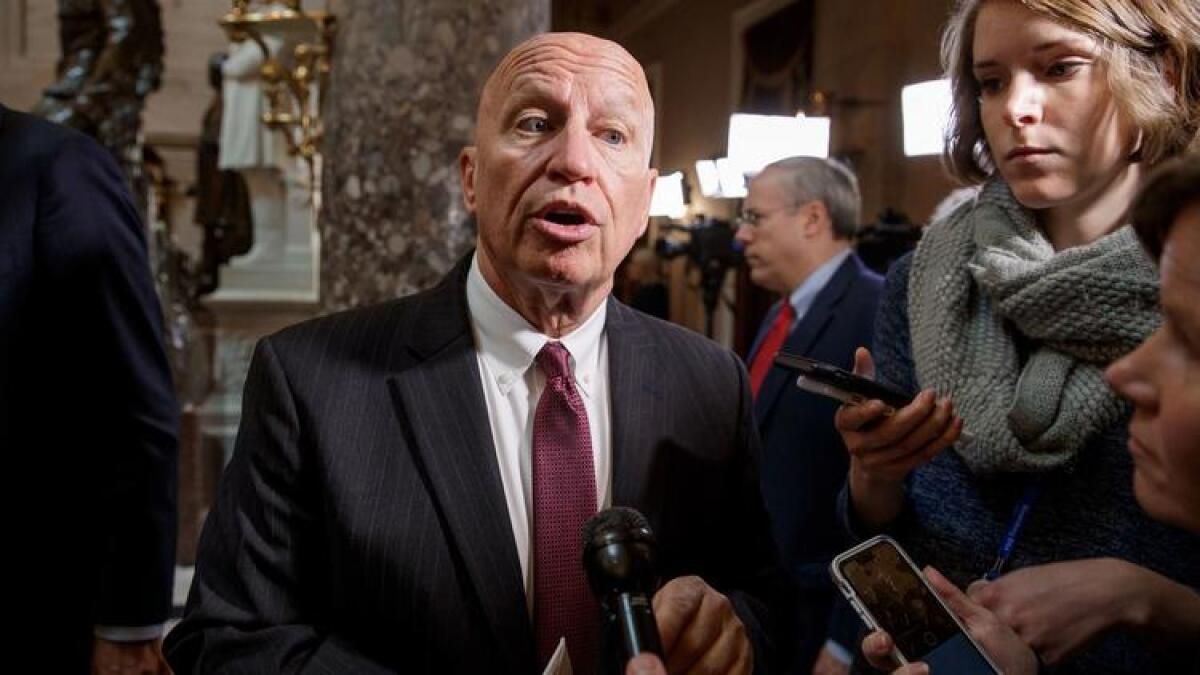
The decision by a key House Republican to maintain the deduction for property taxes but not for other state and local taxes is a victory for California but a bigger win for residents of other states.
While California has the highest state income tax rate in the nation, the state ranks in the bottom third by one measure for property taxes, which have been limited since voters passed Proposition 13 in 1978.
However, the deal to keep part of the state and local deduction in the Republican tax overhaul bill set to be unveiled Wednesday still would be a win for California.
It’s just not as big a victory as it is for New York, New Jersey and several other states, where property taxes make up a larger share of the overall tax burden, said Jared Walczak, a senior policy analyst at the nonpartisan Tax Foundation.
“California receives a substantially high benefit from the property tax deduction,” he said. “It’s just that California receives such a disproportionate benefit of the overall state and local tax deduction that this looks more modest by comparison.”
- Share via
Trump boasts of superior relationship with Philippines President Duterte, who is accused of human rights violations
President Trump’s planned meeting with President Rodrigo Duterte of the Philippines during a regional summit in Manila on Nov. 12-13 was already controversial.
Human rights groups have accused Duterte of allowing death squads to kill thousands of supposed drug users, and he has called former President Obama a “son of a whore” who can “go to hell.”
Trump, as he often does, turned it up a notch Tuesday as he seemed to brag that he would have a superior relationship with Duterte than his predecessor.
“We’re going to the Philippines,” he told reporters as he described his upcoming 12-day trip to five countries in Asia, taking a break during a meeting on tax reform. “Which is a strategically important location where the previous administration was not exactly welcome, as you may remember.”
That came after a senior White House official briefed reporters on the trip earlier Tuesday and emphasized that Trump and Duterte have exchanged letters and spoken by phone as part of a thawing of relations between the two countries.
“There’s a warm rapport there,” the official said.
The Philippines is a former U.S. colony and relations between Washington and Manila have long been fraught.
In 1991, the government there forced the Pentagon to abandon two major bases in the Philippines, but the two countries have cooperated closely in counter-terrorism operations since the Sept. 11, 2001, attacks.
- Share via
President Trump tweets again, trying to turn spotlight on Democrats
President Trump continued broadcasting his frustration with Monday’s announcement of two indictments and one guilty plea of top figures in his campaign, sending a second series of tweets Tuesday morning intended to deflect attention to Democrats.
The presidential tweets, amid one of the most challenging weeks of his presidency, mark yet another precedent broken by Trump. Many legal analysts have advised him against making impromptu public statements on social media during the investigation.
It is unclear what he meant when he said that the Podesta brothers could “drain the swamp.” John Podesta served as Hillary Clinton’s campaign chairman. His brother Tony, who is also close to the Clintons, resigned from his Democratic lobbying firm amid the furor of the Russia probe on Monday.
Podesta’s firm is referenced, though not by name, in the indictment against Paul Manafort, Trump’s former campaign manager who was charged Monday. The firm worked on a contract with Manafort for a Ukrainian government political party.
- Share via
Trump aide who pleaded guilty went from an ‘excellent guy’ to a ‘low-level volunteer’
President Trump broke a nearly daylong Twitter silence Tuesday to characterize a former campaign aide who has pleaded guilty to lying to the FBI as a “young low-level volunteer” who “few knew.”
That might come as a surprise to candidate Donald Trump, who in a March 2016 meeting with the editorial board of the Washington Post highlighted George Papadopoulos’ role in his campaign.
Asked about a pending announcement of his foreign policy team, Trump listed Papadopoulos as one of five advisors.
“He’s an energy and oil consultant, excellent guy,” Trump said.
The advisor also was present at a meeting of Trump’s foreign policy team; a picture shows him four seats from Trump.
Papadopoulos pleaded guilty early this month to lying to FBI agents about his contacts with Russia during the campaign. The plea was made public Monday.
Trump’s tweets also erred in their characterization of the timing of events listed in the indictment of his former campaign manager Paul Manafort and Manafort’s chief aide, Richard Gates. While the 12-count indictment on money laundering, conspiracy and other charges involved events before the campaign, prosecutors specified that the acts continued until 2017.
Trump had tweeted similar sentiments after the Manafort and Gates indictments were announced, but he had not commented since the Papadopoulos plea was made public.
- Share via
Chief of Staff John Kelly brushes aside Trump aide charges, endorses new Clinton inquiry
White House Chief of Staff John F. Kelly on Monday brushed aside charges leveled at three Trump campaign aides as part of the special counsel’s investigation of Russia’s interference in the 2016 election, but endorsed a new independent prosecutor to delve into a 2010 uranium company deal that has become a rallying cry for opponents of Hillary Clinton.
Kelly, speaking on Fox News’ “The Ingraham Angle,” claimed that all the activities involving former Trump campaign Chairman Paul Manafort, his chief aide Richard W. Gates III and a foreign policy advisor, George Papadopoulos, occurred “long before they ever met Donald Trump or had any association with the campaign.”
In fact, the investigation, being directed by special counsel Robert S. Mueller III, covered the period in which all three served under Trump. Manafort and Gates were charged in a 12-count indictment that alleged money laundering, among other crimes. Papadopoulos pleaded guilty to lying to the FBI about his contacts with Russians during the campaign.
Ingraham did not correct Kelly, who later went on to say that “the reaction of the administration is to let the legal system work. … Everyone is presumed innocent and we’ll see where it goes.”
Kelly also expressed confidence that the Mueller investigation was nearing its end.
“It should wrap up soon,” he said. “It would seem that they’re toward the end of the witness pile.”
“I don’t know how much longer it can possibly go on,” he said, adding that the president found the investigation “very distracting.”
- Share via
Manafort’s lawyer lashes out at special counsel
Paul Manafort’s attorney mocked the prosecution of his client Monday afternoon at the entrance of the federal courthouse in Washington, where Manafort and his longtime business associate had just been ordered by a judge to home confinement and to post millions of dollars in bail.
Kevin Downing, attorney for the former chairman of the Trump campaign, called the indictment “ridiculous.” He repeated President Trump’s assertion, posted on Twitter earlier in the day, that there was no evidence of collusion between the campaign and Russia. And he accused the special counsel’s office of pursuing a “novel” prosecution strategy that has only been attempted a half dozen times in the last 50 years, resulting in just one conviction.
Manafort “was seeking to further democracy and to help the Ukraine come closer to the United States and to the E.U.,” Downing said of the payments to his client from Ukrainian officials which are a focus of the indictment. “Those activities ended in 2014. Over two years before Mr. Manafort served in the Trump campaign.”
Downing labeled as “ridiculous” the prosecution’s argument that Manafort was concealing income from the government through a network of offshore accounts.
His comments came shortly after Manafort and his associate Rick Gates solemnly waked into the courtroom in dark suits to enter their pleas of not guilty. The men were ordered by a judge to home confinement with daily check-ins and electronic monitoring. Both men had already turned their passports over to federal law enforcement prior to the arraignment.
Manafort was ordered to post a $10-million unsecured bond after prosecutors warned his vast wealth and extensive network of contacts overseas make him a flight risk. They acknowledged that pinpointing exactly how much money Manafort had in the bank had proven difficult. The cache of loan applications and other documents prosecutors have in their possession suggested that Manafort’s net worth could be anywhere from $20 million to $100 million, they said.
- Share via
Ukrainian lawmaker happy about Paul Manafort’s indictment
A Ukrainian lawmaker said Monday he was glad to learn that former Donald Trump campaign manager Paul Manafort had been indicted in the U.S. on charges largely stemming from his work as a consultant to a former Ukrainian president accused of bilking the country of billions of dollars.
Sergei Leshchenko, an Ukrainian lawmaker who spearheaded an investigation into allegations that Manafort received as much as $12.7 million in secret cash payments from a pro-Russia political party in Ukraine, said the indictment showed that the “bad guys will be punished.”
“I’m very happy,” Leshchenko said by phone from Kiev on Monday evening. “A corrupt American spin doctor helped [former Ukrainian President Viktor] Yanukovych win elections and push Ukraine toward a pro-Russia agenda. He was paid by corrupt people who stole Ukrainian taxpayers’ money.”
Manafort was indicted on several charges of money laundering and tax evasion. He pleaded not guilty to the charges. The charges are linked to Manafort’s work during 10 years for a Russia-leaning political party in Ukraine called the Party of Regions.
That party supported Yanukovych, who was ousted in February 2014 during mass street protests known as the Maidan revolution. Hundreds of thousands of people took to the streets of the Ukrainian capital of Kiev to protest Yanukovych’s reversal on a promise to sign a trade and association agreement with the European Union. The street protests were followed by the Russian annexation of Crimea, and a military conflict in the east with Kremlin-backed separatist militias.
“I feel like I didn’t waste my time on this, even though there was a lot of skeptics when I first started,” Leshchenko said. “People said it wasn’t a good way to begin relations with the new administration. But it’s important to show that the bad guys will be punished.”
- Share via
White House: Charges against Manafort have ‘nothing to do with’ Trump

The White House downplayed indictments on Monday against President Trump’s former campaign manager and two other aides, including one who pleaded guilty to lying to the FBI, as having “nothing to do” with the president or his election effort.
“Today’s announcement has nothing to do with the president, has nothing to do with the president’s campaign or campaign activity,” White House Press Secretary Sarah Huckabee Sanders said.
Paul Manafort, Trump’s former campaign manager, and Rick Gates, whom the indictment called “Manafort’s right-hand man,” pleaded not guilty to 12 charges of money laundering and conspiracy, the first charges filed in special counsel Robert S. Mueller III’s investigation of connections between the Trump campaign and Russian efforts to influence last year’s presidential election.
The indictment alleges that for at least a decade, through 2016, Manafort and Gates failed to properly disclose more than $75 million in payments from Ukraine’s government, then pro-Moscow, for lobbying and public relations to influence U.S. policy in its favor.
“We’ve been saying from Day One there is no evidence of Trump-Russia collusion and nothing in the indictment today changes that at all,” Sanders said, echoing earlier tweets from Trump. Like him, she sought to deflect attention by saying that “the real collusion scandal” is related to the Clinton campaign efforts to collect opposition research on Trump.
Sanders’ dismissiveness was challenged, however, by the indictment and guilty plea of the third former aide, foreign policy advisor George Papadopoulos, who confessed to making false statements about his contact with Russians during the campaign. He is cooperating with prosecutors.
Sanders sought to diminish Papadopoulos’ role in the campaign, describing him as a member of a “volunteer advisory council” that met perhaps once. If so, it put him near the right hand of Trump, as a photo Trump once tweeted shows.
Sanders said Papadopoulos’s outreach to senior campaign officials to have Trump meet with Russian officials “was repeatedly denied.” He “reached out and nothing happened beyond that,” Sanders said.
“It has nothing to do with the activities of the campaign, it has to do with this failure to tell the truth,” she added.
When asked why Trump appears in the March 2016 campaign photograph with Papadopoulos, Sanders said Trump appears in “thousands of photographs with millions of people.”
- Share via
$10 million bond for ex-Trump chairman Paul Manafort after not guilty plea in Russia probe
Former Trump campaign chairman Paul Manafort and his business associate Rick Gates were ordered to surrender their passports and remain in home confinement after pleading not guilty Monday in the first indictments from the special counsel investigating possible coordination between the Trump campaign and Russia.
Manafort was released on $10 million bond and Gates on $5 million.
The two, who were arrested earlier in the day, appeared before a federal judge here Monday afternoon.
They are charged with a total of 12 counts that include conspiracy to launder money, failing to registered as a foreign agent, false statements, and failure to file reports of foreign bank and financial accounts.
Federal prosecutors in the office of Robert S. Mueller III, the special counsel, accused Manafort of hiding roughly $75 million he received in payment for lobbying he did for agents of the former President of Ukraine, Victor Yanukovych and his Party of Regions.
- Share via
Federal court bars Trump from reversing transgender troops policy
A federal court in Washington, D.C., is barring President Trump from changing the government’s policy on military service by transgender people.
Trump first announced in a July tweet and then in an August memo that he intended to reverse course on a 2016 policy that allowed troops to serve openly as transgender individuals. He said he would order a return to the policy prior to June 2016, under which service members could be discharged for being transgender.
U.S. District Court Judge Colleen Kollar-Kotelly wrote Monday that transgender members of the military who had sued over the change were likely to win their lawsuit and barred the Trump administration from reversing course.
- Share via
Former Trump campaign aide George Papadopoulos pleads guilty to lying to the FBI agents in Mueller probe
A former foreign policy advisor to Donald Trump’s presidential campaign has pleaded guilty to lying to the FBI about his contacts with Russians who claimed to have “thousands of emails” on Hillary Clinton, in the latest charges filed in the investigation of the Trump campaign’s contacts with Russia.
George Papadopoulos, 30, of Chicago, has agreed to cooperate with the investigation led by special counsel Robert S. Mueller III, according to a plea agreement unsealed on Monday.
He pleaded guilty on Oct. 5 to making false statements to disguise his contacts with Russians whom he thought had “dirt” on Clinton, according to court papers. He was arrested in July as he got off a plane at Dulles International Airport.
After he was contacted by an unnamed Russian professor in March, Papadopoulos exchanged emails with an official in the Russian foreign ministry, court papers say. Among the topics he discussed was a possible visit by Trump to Russia.
“As mentioned we are all very excited by the possibility of a good relationship with Mr. Trump,” one Russian emailed him.
In April, after he had become an advisor to the campaign, Papadopoulos met with the Russian professor at a London hotel. The professor said he had just returned from a trip to Moscow, where he was told “the Russians had emails of Clinton.”
Papadopoulos told other leaders in the Trump campaign that he was in contact with Russians, and said there were some “interesting messages coming in from Moscow about a trip.”
An unnamed campaign official, described as a campaign “supervisor,” encouraged him to make the trip, a document reads.
Papadopoulos was one of several foreign policy advisors to Trump during his campaign.
Papadopoulos previously had served as a policy and economic advisor to Ben Carson, who notably struggled with domestic and foreign policy issues during his failed presidential run.
Before that, the 30-year-old was a consultant at a London-based oil and gas company. He’s a director at the London Centre of International Law Practice. He graduated from DePaul University in 2009.
UPDATES
7:55 a.m.: Adds additional details
- Share via
Sen. Dianne Feinstein on the Manafort charges: ‘The process is working’
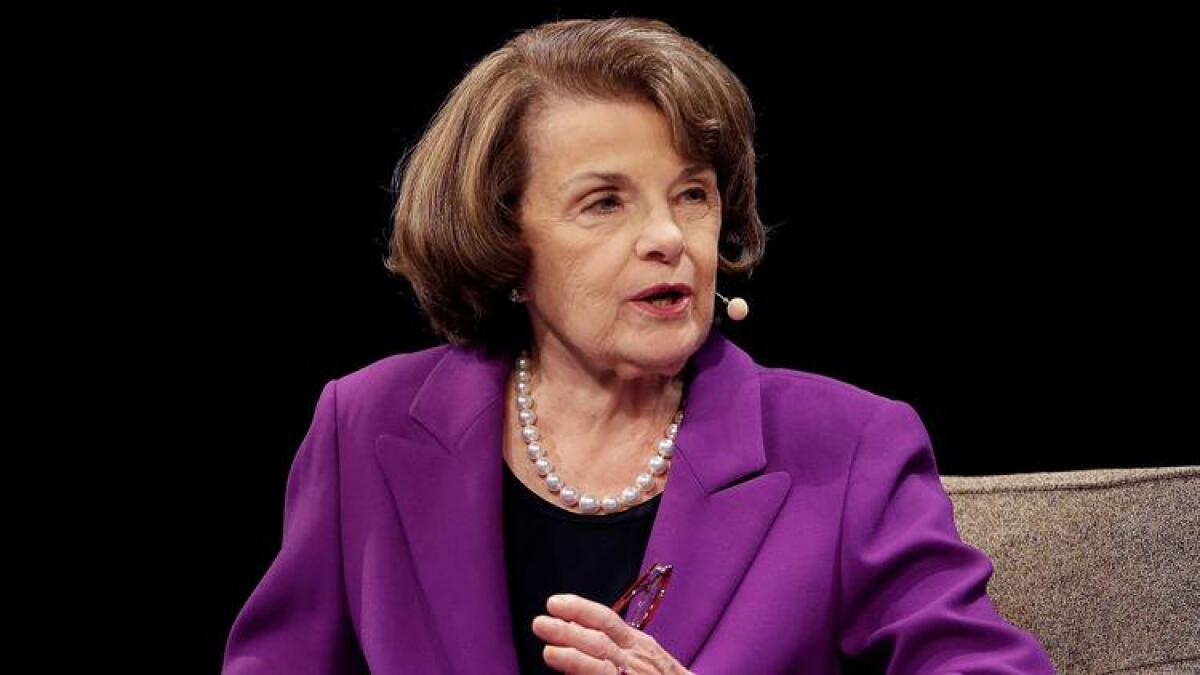
Sen. Dianne Feinstein (D-Calif.), ranking member of the Senate Judiciary Committee, said the charges filed against President Trump’s former campaign chairman Paul Manafort and Manafort’s former business associate showed the special counsel Robert S. Mueller III was “doing his job and the process is working.”
“I’ll continue to support Bob Mueller as he follows the facts — his independence must remain sacrosanct,” the California Democrat said in a statement.
On Friday, Feinstein sent letters requesting information from the White House, Michael Cohen, Facebook, Twitter and Cambridge Analytica on Russia’s use of technology to interfere with the election.
“Bob Mueller’s criminal investigation is important, but Congress has a responsibility to get to the bottom of this and work to make sure it never happens again. That’s why it’s so vital that the congressional investigations continue.”
- Share via
Trump responds to Paul Manafort charges: ‘There is NO COLLUSION!’
- Share via
Watch as Paul Manafort arrives at an FBI office to surrender

Former Trump campaign manager Paul Manafort walks into an FBI field office in Washington on Monday after being indicted in special counsel Robert Mueller’s Russian meddling probe.
- Share via
GOP says lower-tax states are subsidizing California. It’s the other way around, and tax overhaul could make it worse
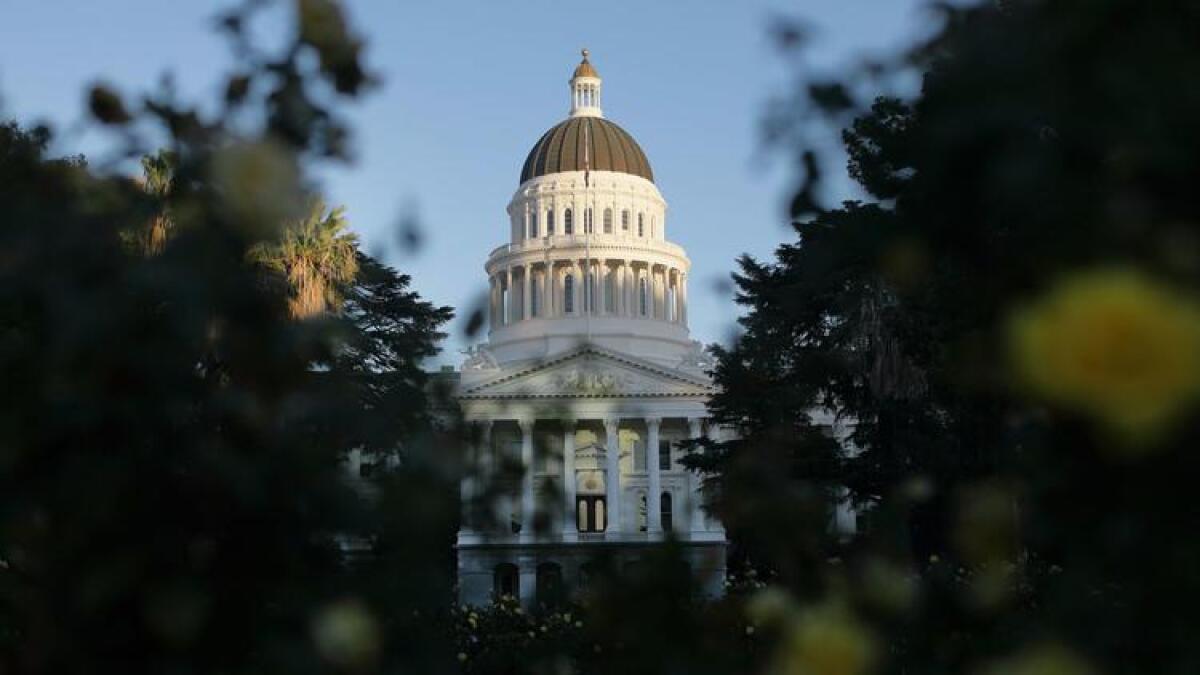
The main Republican argument for killing the state and local tax deduction is that the break forces residents of low-tax states to subsidize those in California and other high-tax states.
But when it comes to federal taxes, the data show that it’s the other way around. And it could get worse for Californians if the deduction is eliminated as part of the GOP tax overhaul.
California is among 13 states that ship more tax money to Washington than they get back in federal spending, according to the Rockefeller Institute of Government, a public policy think tank in Albany, N.Y.
They’re known as donor states, a title California has held for years, mostly because of the state’s relatively younger population and large number of high-income earners.
Killing the state and local tax deduction, as President Trump and congressional Republican leaders have proposed, probably would tilt the equation even more against California.
- Share via
Trump campaign manager Manafort, ex-aide charged in Russia probe
Paul Manafort, President Trump’s former campaign manager, has been indicted on 12 charges of money-laundering and conspiracy, the first charges filed in the investigation of possible connections between the Trump campaign and a Russian effort to influence last year’s presidential election.
Manafort, 68, turned himself in at FBI headquarters early Monday for his role in an alleged scheme to use offshore accounts to hide tens of millions of dollars in payments he received for representing a pro-Kremlin political faction in the Ukraine.
Manafort also was charged with filing false reports to conceal the fact that he was acting as an unregistered foreign agent. Also charged in the indictment was Richard W. Gates III, a top business aide to Manafort.
The charges state that Manafort and Gates were agents for former Ukraine President Victor Yanukovych and his Party of Regions.
Manafort and Gates used a variety of offshore accounts in Cyprus and other bank secrecy havens to hide $75 million in payments for the lobbying work, allowing them to avoid filing required registrations and to avoid paying taxes, according to the indictment.
“Manafort used his hidden overseas wealth to enjoy a lavish lifestyle in the United States, without paying taxes on that income,” the charges said.
The White House declined comment on the charges.
Former FBI Director Robert S. Mueller III was named as special counsel in May to investigate the Russian attempts to influence the election, but the charges are not directly tied to that operation. Mueller also has authority to investigate any related crimes that his team uncovers.
Manafort worked for the Trump campaign from March until August, serving for several months as campaign chairman.
>> The charges against Paul Manafort and Rick Gates
UPDATES
6:19 a.m.: This post was updated with the addition of charges against Manafort and Gates
6:38 a.m.: This post was updated with additional details
- Share via
Puerto Rico says it’s scrapping $300-million Whitefish contract amid increased scrutiny
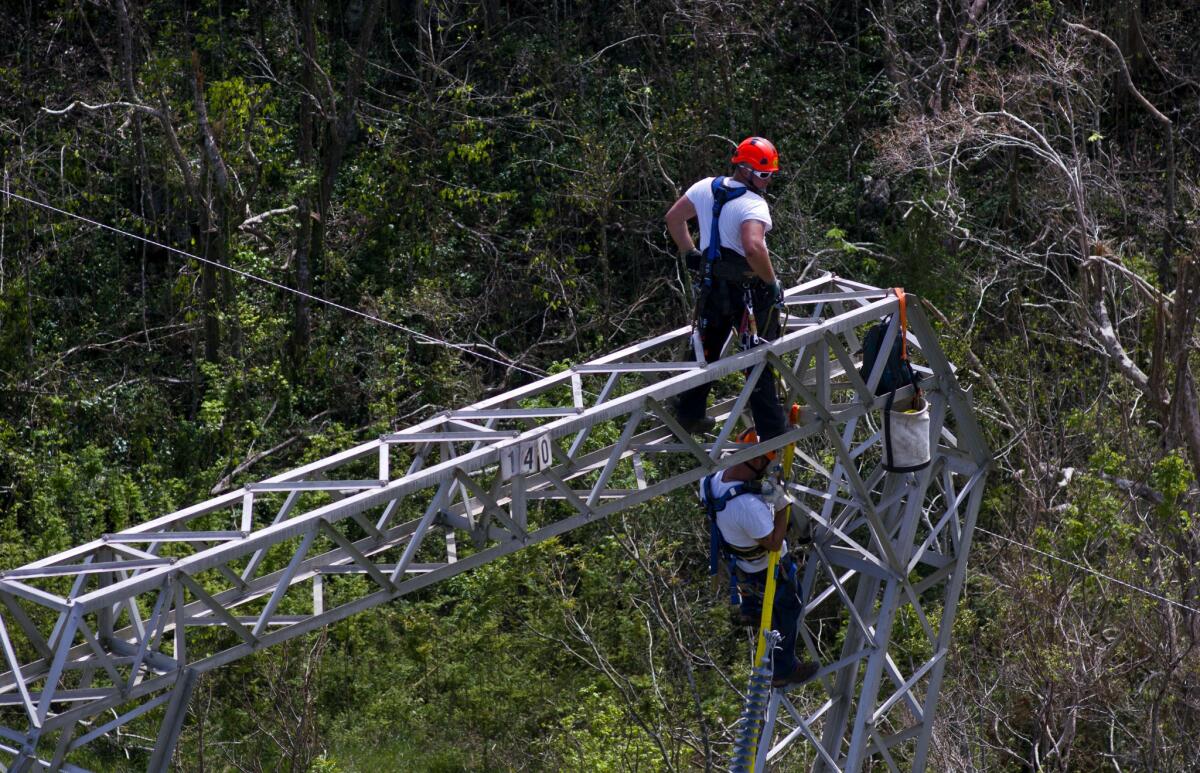
The head of Puerto Rico’s power company said Sunday the agency will cancel its $300-million contract with Whitefish Energy Holdings amid increased scrutiny of the tiny Montana company’s role in restoring the island’s power system following Hurricane Maria.
The announcement by Ricardo Ramos came hours after Gov. Ricardo Rossello urged the company to scrap the deal.
Ramos said that Whitefish will continue with current work, but the contract would then be scrapped — leading to delay of 10 to 12 weeks in completing the work.
It’s an enormous distraction,” he said on why he canceled the contract. “This was negatively impacting the work we’re already doing.”
Federal investigators have been trying to investigate the contract awarded to the small company from Interior Secretary Ryan Zinke’s hometown. The deal, signed shortly before the hurricane hit, is being audited at the local and federal level.
Whitefish spokesman Chris Chiames told the Associated Press before the Ramos announcement that the company would soon issue a comment.
Rossello said earlier that nearly $8 million has been paid to Whitefish so far.
Rossello said he has requested that crews from New York and Florida come help restore power in Puerto Rico as he criticized the U.S. Army Corps of Engineers for not meeting its goals. The agency could not be immediately reached for comment.
The governor also announced the appointment of an outside coordinator to oversee the power company’s purchase and contracting division.
“If something illegal was done, once again, the officials involved in that process will feel the full weight of the law, and I will take administrative actions,” Rossello said.
Roughly 70% of the island remains without power more than a month after Hurricane Maria struck the U.S. territory on Sept. 20 as a Category 4 storm with winds of up to 154 mph.
Ramos has said that Puerto Rico’s Electric Power Authority reached a deal with Whitefish just days before the hurricane struck, saying that he spoke with at least five other companies that demanded similar rates, in addition to a down payment the agency did not have.
Ramos also has said the Federal Emergency Management Agency had approved of the deal, something the agency has denied.
FEMA said it has not approved any reimbursement requests from the power company for money to cover repairs to the island’s electrical system. The contract said the utility would not pay costs unallowable under FEMA grants, but it also said, “The federal government is not a party to this contract.”
FEMA has raised concerns about how Whitefish got the deal and whether the contracted prices were reasonable. The 2-year-old company had just two full-time employees when the storm hit, but it has since hired more than 300 workers.
A Whitefish contract obtained by the Associated Press found that the deal included $20,277 an hour for a heavy lift Chinook helicopter, $650 an hour for a large crane truck, $322 an hour for a foreman of a power line crew, $319 an hour for a journeyman lineman and $286 an hour for a mechanic. Each worker also gets a daily allowance of $80 for food, $332 for a hotel room and $1,000 for each flight to or from the mainland.
Whitefish Energy Holdings is based in Whitefish, Mont. Zinke, a former Montana congressman, knows Whitefish CEO Andy Techmanski, and Zinke’s son also had a summer job at a Whitefish construction site.
“I had absolutely nothing to do with Whitefish Energy receiving a contract in Puerto Rico,” Zinke recently said in a statement linked to a tweet. “Any attempts by the dishonest media or political operatives to tie me to awarding or influencing any contract involving Whitefish are completely baseless.”
Democrats also have questioned the role of HBC Investments, a key financial backer of Whitefish Energy. The Dallas-based company’s founder and general partner, Joe Colonnetta, has contributed thousands of dollars to Trump and other Republicans. Chiames has said Colonnetta’s political donations were “irrelevant” and that the company would cooperate with any federal authorities.
This week, Rep. Rob Bishop, the Utah Republican who heads the House Natural Resources Committee, sent the power company director a letter demanding documents, including those related to the contract with Whitefish and others that show what authority the agency has to deviate from normal contracting processes.
“Transparent accountability at [the power company] is necessary for an effective and sustained recovery in Puerto Rico,” his office said in a statement.
A federal control board that oversees Puerto Rico’s finances announced this week that retired Air Force Col. Noel Zamot will be in charge of power reconstruction efforts. Rossello and other officials have rejected the appointment, saying the local government is in charge of a power company that is $9 billion in debt and that had struggled with ongoing outages before hurricanes Irma and Maria hit last month.
1:20 p.m.: This story has been updated with Puerto Rico saying it will cancel its contract with Whitefish.
This story originally published at 8:21 a.m.
- Share via
White House press secretary insists women accusing Trump of sexual assault are lying

President Trump’s spokeswoman maintained Friday that all of the women who have accused him of unwanted touching or kissing were lying.
“Yeah, we’ve been clear on that from the beginning, and the president has spoken on it,” White House Press Secretary Sarah Huckabee Sanders said when asked if Trump’s position on accusations against the president was that “all of these women are lying.”
Accusations against Trump arose during last year’s presidential campaign, when at least 11 women described physical actions by the president that they found offensive. Trump at the time called the women “horrible liars” and suggested in at least one case that he was not physically attracted to the woman making the accusation.
The president himself, however, was caught bragging in vulgar language, on a 2005 video made by the “Access Hollywood” show, about grabbing and kissing women without their permission.
Then the lead character on the “Apprentice” television show, Trump said on the video that he got away with the actions because he was “a star.”
Trump’s actions have received renewed interest since movie producer Harvey Weinstein has been accused by dozens of women of inappropriate sexual acts. Weinstein lost his post at his family company; the fallout also has tarnished journalist Mark Halperin, who was suspended from his MSNBC and NBC analyst roles after several women accused him of harrassment when he directed political coverage years ago at ABC News.
Trump has maintained his innocence during his presidency, as he did in the campaign.
Eleven days ago, during a press briefing with Senate Majority Leader Mitch McConnell (R-Ky.), Trump was asked about his campaign being subpoenaed by one of his accusers for documents related to the 2016 allegations.
“All I can say is it’s totally fake news. It’s just fake. It’s fake,” he said. “It’s made-up stuff, and it’s disgraceful what happens. But that’s [what] happens in the world of politics.”
Earlier, Trump told reporters that he was not taken aback by the alleged actions against Weinstein, a longtime Democratic donor.
“I’ve known Harvey Weinstein for a long time. I’m not all surprised to see it,” Trump said on Oct. 7.
Asked about the accusations leveled against him, Trump attempted to brush them aside.
“That’s locker room. That’s locker room,” he said, employing the same description he used when the “Access Hollywood” tape first surfaced a year ago.
- Share via
Watch live: Briefing with White House Press Secretary Sarah Huckabee Sanders
- Share via
Narrow House passage of GOP budget resolution suggests tax reform plan faces a tough road
House Republicans’ narrow passage Thursday of a 2018 budget resolution points to how much work still lies ahead to push through President Trump’s tax cut package.
The largely partisan tax plan, aimed chiefly at lowering corporate tax rates, is set to be unveiled in a matter of days.
- Share via
Pentagon chief at Korea’s demilitarized zone: ‘Our goal is not war’
Days after North Korea threatened to test a nuclear weapon above ground, Defense Secretary James N. Mattis visited the Demilitarized Zone that divides that country from South Korea and declared: “Our goal is not war.”
On Friday, he visited the heavily fortified border area, where U.S. and South Korean troops maintain a constant presence opposite North Korean forces. Mattis stressed the need for a “diplomatic solution” to the tensions with Pyongyang, which have been building under President Trump, who has repeatedly sent more provocative signals, especially on Twitter.
“North Korean provocations continue to threaten regional and world peace, and despite unanimous condemnation by the United Nations’ Security Council, they still proceed,” Mattis said. “As Secretary of State [Rex] Tillerson has made clear, our goal is not war but rather the complete, verifiable and irreversible denuclearization of the Korean peninsula.”
A senior North Korean official told CNN on Wednesday to take “literally” the isolated nation’s threats that it might conduct an atmospheric nuclear test over the Pacific.
That would be a major escalation. All six of North Korea’s previous nuclear tests have been underground. No nation has conducted an atmospheric nuclear test since China in 1980.
During his visit, Mattis was joined by South Korean Defense Minister Song Young-moo.
Song, acknowledging that North Korea continues to develop nuclear weapons and missiles, added that the weapons “should never be used.”
“Should they ever use it, they will be faced with the strong might” of joint South Korean and American forces, Song said, “and they will be met with a proportional and firm response.”
Mattis also visited the Blue House, South Korea’s presidential residence, and met with President Moon Jae-in. His trip comes ahead of Trump’s visit to Asia next month, though the White House has said that the president will not visit the Demilitarized Zone, as past presidents have.
- Share via
Virginia governor’s race polls gyrate, an example of guesswork over who will show up to vote on Nov. 7
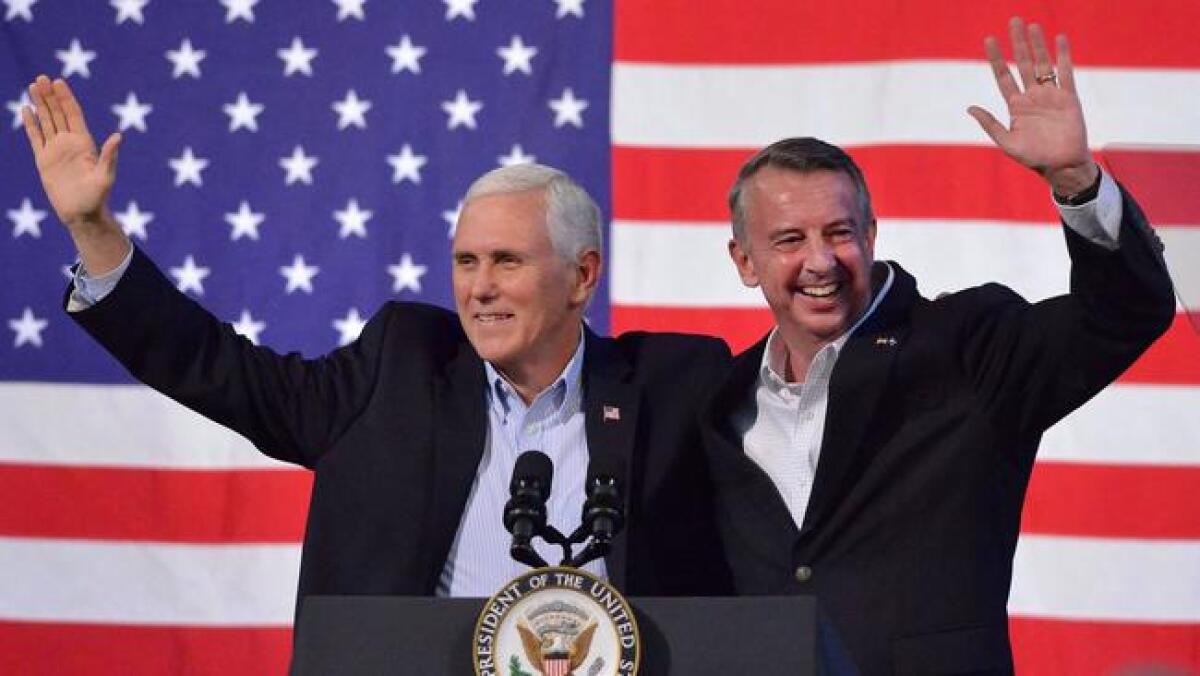
Those looking at polls to find out who’s ahead in the hard-fought Virginia governor’s race have a case of whiplash.
The contest is the most-watched of the season, coming almost exactly a year after President Trump’s election in a place whose electorate resembles the United States writ small.
Democrats and Republicans consider the race a bellwether for views of Trump’s presidency, and the president’s antics in Washington have overshadowed the two candidates, Democrat Ralph Northam and Republican Ed Gillespie.
Those working on the campaigns consider the race to be close, making it all the weirder that recent polls have shown rather comfortable leads — for both candidates.
A Fox News poll released Oct. 17 gave Northam a seven-point advantage: 49%-42%. A survey by Hampton University, released Oct. 22, had Gillespie ahead by eight points, 41%-33%. A poll by the Wason Center for Public Policy at Christopher Newport University, released Friday, had Northam ahead by seven, 50%-43%.
The differences stem from the alchemy of polling, which combines research and other factors to come up with a reasonable expectation of which voters actually will show up on election day. As the 2016 presidential contest showed, variation in turnout — say a higher rural vote benefitting Donald Trump or a lower African American turnout hurting Hillary Clinton — can produce unforeseen results.
In Virginia, the latest three polls seemed to differ on the make-up of the electorate.
In the Fox poll, 45% of voters identified themselves as Democrats, to 42% Republican and 13% independents. In the Hampton poll, the proportion of Republicans rose, with 49% saying they leaned Republican, to 37% leaning Democratic. In the Wason Center survey, Democrats represented 36% of the sample and Republicans 33%.
It’s a pithy cliche of politics, most often uttered by the candidate trailing as voting nears: The only poll that counts is the one on election day.
In Virginia this year, that happens to be true.
- Share via
Trump administration belatedly takes step toward new Russia sanctions
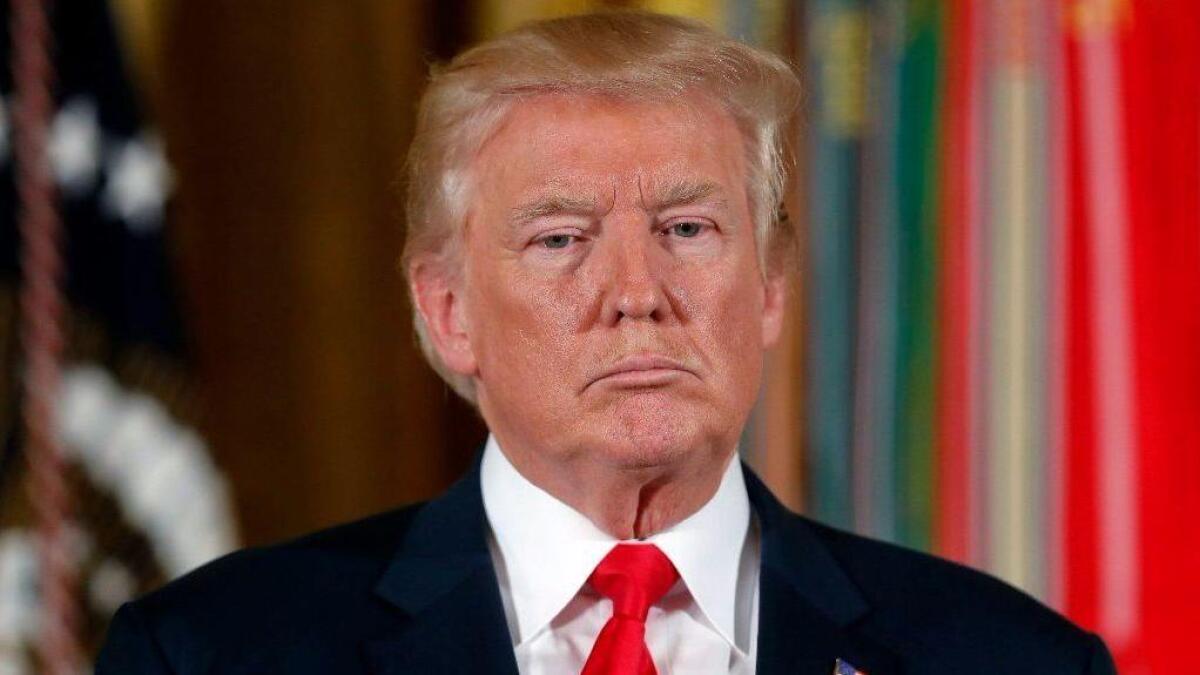
The Trump administration belatedly has taken the first steps toward imposing new sanctions on Russian officials to punish Moscow for interfering in the 2016 election.
In early August, after considerable delay, Trump signed into law a measure that required the new sanctions, which target individuals with ties to Russian defense and intelligence agencies. Under the law, companies that do business with those individuals could be subject to U.S. sanctions.
The law gave the administration until Oct. 1 to produce a list. After the administration missed that deadline, members of Congress and others have stepped up criticism of Trump on the issue. Late Thursday, Secretary of State Rex Tillerson authorized officials to release the list to key members of Congress.
The names haven’t been made public yet, but that’s expected to happen in coming days. The idea is to give companies time to unwind any connections they may have with the named individuals before the new sanctions take effect in late January.
In a joint statement, Sens. John McCain (R-Ariz.) and Ben Cardin (D-Md.), who have been among the leaders in Congress on the sanctions issue, praised the administration for taking a first step, but warned that recent cutbacks at the State Department could hamper the sanctions.
The State Department needs to “dedicate robust staffing and resources to the implementation effort,” they said, noting that Tillerson has downgraded the department’s sanctions office and “a number of its staff have resigned.”
- Share via
Trump’s push to revive coal mining puts Utah dinosaur discoveries in danger, scientists say
The creature looked like a three-ton rhino crossed with a tropical lizard. Ten little horns dangled over its giant forehead like frills on a jester’s cap and two more perched over the eyes. Spikes poked out of each cheek. A blade jutted from its nose.
Paleontologists suspect this freakish beast, named kosmoceratops, was brightly colored to attract mates. It prowled the coastal swamps of southern Utah 79 million years ago.
It is one of more than two dozen new species of dinosaurs discovered in Grand Staircase-Escalante in the 21 years since President Clinton preserved it as a national monument.
The bounty has stunned scientists. Most of this 1.9 million acres of desert wilderness, one of the world’s richest fossil sites for studying the age of dinosaurs, remains unexplored.
But scientists now fear President Trump will soon spoil it.

Interior Secretary Ryan Zinke, ordered by Trump to reassess the biggest national monuments named since 1996, has proposed shrinking Grand Staircase-Escalante. Whatever area is removed would be open to coal mining, oil drilling and mineral extraction.
The fossil beds here are scattered across land that also holds an estimated 62 billion tons of coal.
“My fear is that opening up the monument to energy extraction will threaten our ability to uncover the secrets that we know must still be buried in the monument,” said Scott Sampson, a Canadian paleontologist who oversaw much of the early dinosaur research in the monument.
- Share via
Here’s why Republicans could help send Dianne Feinstein back to Washington — even if they can’t stand her
Larry Ward is no fan of Dianne Feinstein.
“Time to retire,” he says of the Democratic senator from California. “Too old.”
Coming from a Republican such as Ward, that’s hardly surprising. He’d have gladly been rid of Feinstein a long time ago.
But it’s voters like Ward — conservatives who feel voiceless and adrift, bobbing like red specks in a blue sea — who could help usher the 84-year-old Feinstein back to Washington with a new lease on her Senate seat.
Like most voters here in El Dorado County, Ward supported President Trump. He can’t understand why Democrats and the media pile on and keep him from cutting taxes and fulfilling a campaign pledge to repeal Obamacare.
He certainly doesn’t think Feinstein’s been too kind to Trump — the argument made by her newly announced challenger, Kevin de León. The state senator from Los Angeles and others on the left were spitting fire a few weeks back when Feinstein allowed as how she hoped, given time and a radical transformation, Trump might end up being a good president.
- Share via
Pentagon chief Jim Mattis stresses diplomacy in Korean crisis
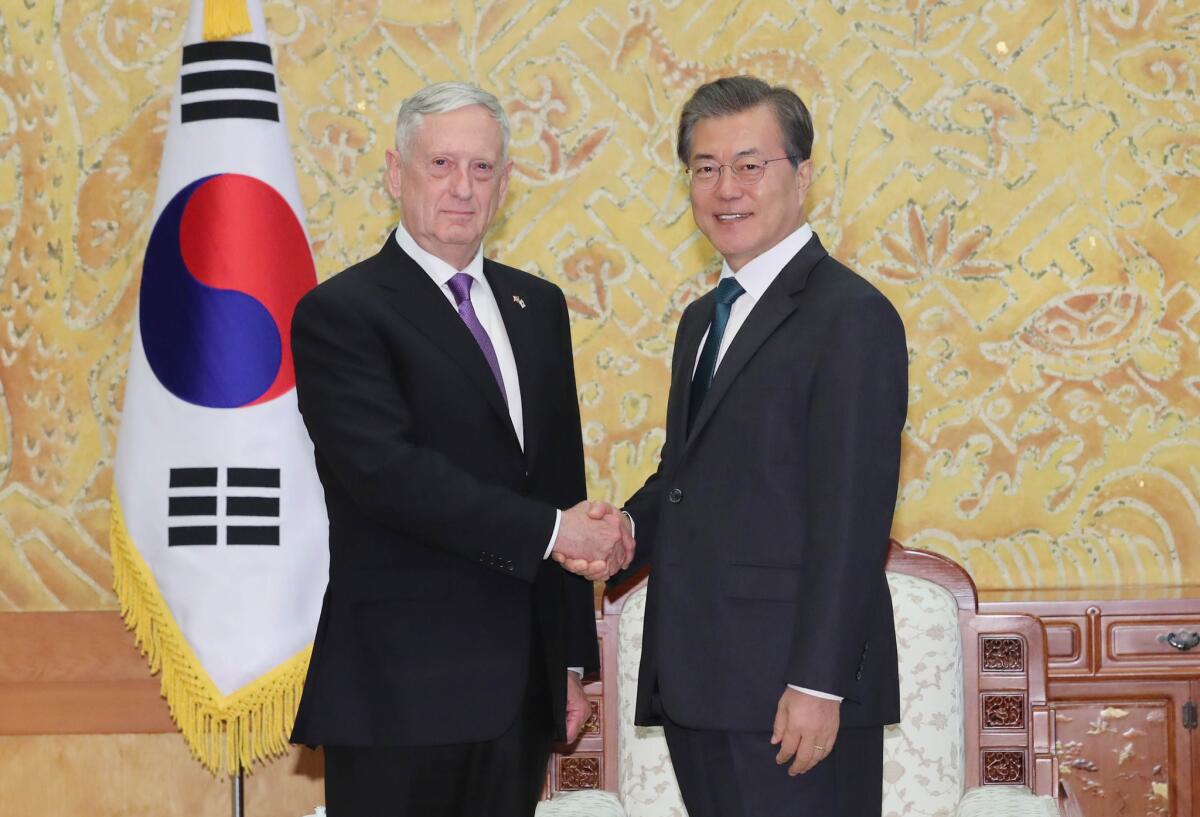
On his first visit to the tense but eerily quiet frontier between North and South Korea as U.S. secretary of defense, Jim Mattis conveyed the message he hopes will win the day: Diplomacy is the answer to ending the nuclear crisis with the North, not war.
He made the point over and over - at the Panmunjom “truce village” where North literally meets South; at a military observation post inside the Demilitarized Zone, and in off-the cuff comments to U.S. and South Korean troops.
“We’re doing everything we can to solve this diplomatically - everything we can,” he told the troops after alighting from a Black Hawk helicopter that had ferried him to and from the border some 25 miles north of central Seoul.
“Ultimately, our diplomats have to be backed up by strong soldiers and sailors, airmen and Marines,” he added, “so they speak from a position of strength, of combined strength, of alliance strength, shoulder to shoulder.”
At Panmunjom, where the armistice ending the Korean War was signed in July 1953, Mattis quoted Secretary of State Rex Tillerson as saying, “Our goal is not war.” The aim, he said, is to compel the North to completely and irreversibly eliminate a nuclear weapons program that has accelerated since President Trump took office.
Despite unanimous condemnation by the United Nations Security Council of the North’s missile launches and nuclear tests, “provocations continue,” Mattis said.
Mattis’ counterpart, South Korean Defense Minister Song Young-moo, gave the former four-star Marine general the lay of the land, noting that the North has 342 long-range artillery pieces aimed at Seoul, among other weapons. That’s a threat that cannot be defended against, Song said, so Washington and Seoul must come up with “new offensive concepts” to be able to eliminate the artillery before it can be used, should war break out.
On Saturday, Mattis will be joined by Gen. Joseph Dunford, chairman of the Joint Chiefs of Staff, in annual consultations with South Korean defense officials. They are expected to admonish North Korea, vow to strengthen allied defenses, and discuss prospects for eventually giving South Korea wartime control of its own forces.
- Share via
Government watchdog to investigate Trump’s voter fraud commission
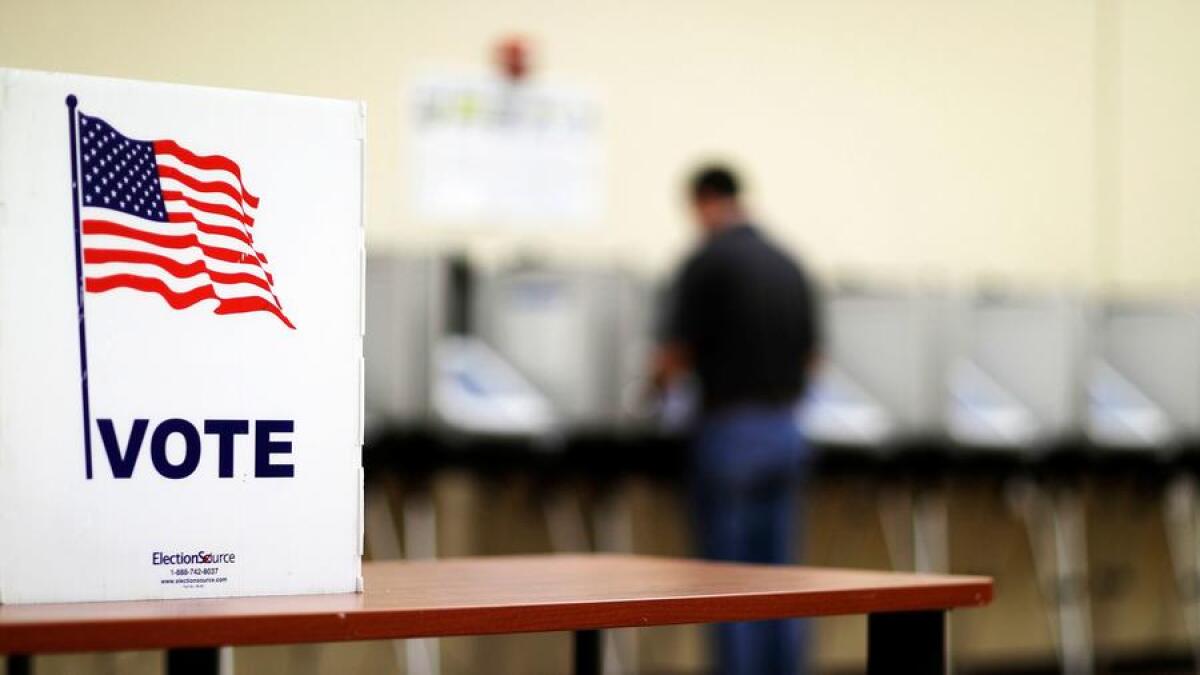
President Trump’s voter fraud commission, already facing several lawsuits, will now be investigated by a government watchdog.
The U.S. Government Accountability Office, an independent nonpartisan agency, announced Thursday that it has accepted a request by Democratic lawmakers to review the commission.
In an Oct. 18 letter requesting an investigation, Democratic Sens. Michael Bennet of Colorado, Cory Booker of New Jersey and Amy Klobuchar of Minnesota wrote that the manner in which the commission is conducting its work “will prevent the public from a full and transparent understanding of the commission’s conclusions and unnecessarily diminish confidence in our democratic process.”
Officials from the GAO wrote back that the review will begin when it has staff available in about five months.
In May, Trump established the commission to study registration and voting processes. Trump has alleged — without evidence — that 3 million to 5 million illegal votes were cast in last year’s presidential election, in which he lost the popular vote by nearly 3 million ballots.
Critics have assailed the commission as both a sham created by an insecure president and a tool to justify measures that would make it harder for minorities to vote. Several groups have filed lawsuits against the commission — which to date has held two public meetings — over privacy concerns and the collection of voter data.
Two Democrats on the bipartisan commission sent letters to leaders of the panel last week condemning a lack of transparency.
- Share via
What’s behind the opioid crisis that prompted a declaration from Trump?
The opioid epidemic has claimed more than 190,000 lives since 1999.
The Times investigated Oxycontin, a prescription drug widely blamed for setting off the epidemic. Over the last 20 years, more than 7 million Americans have abused OxyContin, according to the federal government’s National Survey on Drug Use and Health.
The drugmaker Purdue Pharma launched OxyContin two decades ago with a bold marketing claim: One dose relieves pain for 12 hours, more than twice as long as generic medications.
Patients would no longer have to wake up in the middle of the night to take their pills, Purdue told doctors. One OxyContin tablet in the morning and one before bed would provide “smooth and sustained pain control all day and all night.”
On the strength of that promise, OxyContin became America’s bestselling painkiller, and Purdue reaped $31 billion in revenue.
But OxyContin’s stunning success masked a fundamental problem: The drug wears off hours early in many people, a Los Angeles Times investigation found. OxyContin is a chemical cousin of heroin, and when it doesn’t last, patients can experience excruciating symptoms of withdrawal, including an intense craving for the drug.
The problem offers new insight into why so many people have become addicted to OxyContin, one of the most abused pharmaceuticals in U.S. history.
Our investigation:
“You want a description of hell?’ Oxycontin’s 12-hour problem
How black-market OxyContin spurred a town’s descent into crime, addiction and heartbreak
- Share via
Watch live: President Trump delivers remarks on battling the opioid crisis
- Share via
The Trump wing of the GOP is winning battles. But will it lose the war to keep the Senate in Republican hands?
Sen. Jeff Flake’s surprise decision to not seek reelection marked a major victory for Stephen K. Bannon and his pirate band of Republicans. But the larger question Wednesday was whether the insurgency will cost the GOP its thin majority on Capitol Hill.
The fratricide that Bannon, a former White House advisor, is waging against President Trump’s critics threatens to undermine the party’s Senate hopefuls and has already lifted Democratic prospects, boosting the possibility of shaving the GOP’s 52-48 majority or eliminating it altogether.
“It’s causing Republicans to spend money defending their own rather than focusing on the big target, which should be expanding the size of their governing majority,” said Scott Reed, chief political strategist for the U.S. Chamber of Commerce, one of the citadels targeted by Bannon and his anti-establishment forces.
The insurgency also runs the risk of putting forth candidates unable to broaden their support beyond a fervent but small wing of the GOP, repeating the failings of the tea party movement that cost Republicans winnable Senate seats in 2010 and 2012.
- Share via
Veteran journalist Mark Halperin reportedly out at NBC News, MSNBC after sexual harassment claims
Veteran journalist Mark Halperin reportedly will leave his roles at NBC News and MSNBC after five women claimed he sexually harassed them while he was a top ABC News executive.
The coauthor of the best-selling book “Game Change” told CNN on Wednesday night that he’s “deeply sorry” and is taking a “step back” from day-to-day work to deal with the situation.
His statement came after CNN reported allegations that Halperin propositioned, fondled and pushed himself against five women in the early 2000s while he was ABC News’ political director.
The women, who asked to remain anonymous, said they didn’t report Halperin’s conduct because they feared retribution or were embarrassed.
Halperin says he pursued relationships, sometimes with junior co-workers, but CNN says he denies the groping allegations.
- Share via
Democrats on Trump’s voter fraud commission urge leaders to be more transparent
President Trump’s voter fraud commission, launched by executive order in May with the stated goal of restoring confidence and integrity in the electoral process, is now confronted with pushback from an unlikely group: its own members.
Two Democrats on the bipartisan commission sent letters to leaders of the panel last week condemning a lack of transparency.
“I honestly do not know what’s going on with the commission,” Maine Secretary of State Matthew Dunlap, the author of one of the letters, said Wednesday. “This very much concerns me.”
The correspondence adds to mounting criticism that Trump created the commission with the aim of blaming his popular-vote loss on fraud and to look for new ways to suppress turnout among voters who tend to favor Democrats.
Trump has alleged — without evidence — that between 3 million and 5 million illegal votes were cast in last year’s presidential election in which he prevailed in the electoral college even as Democrat Hillary Clinton garnered nearly 3 million more votes. Studies have consistently shown that voter fraud is virtually nonexistent.
- Share via
Trump would ‘love’ to do a DACA deal, wants it to include border wall funds
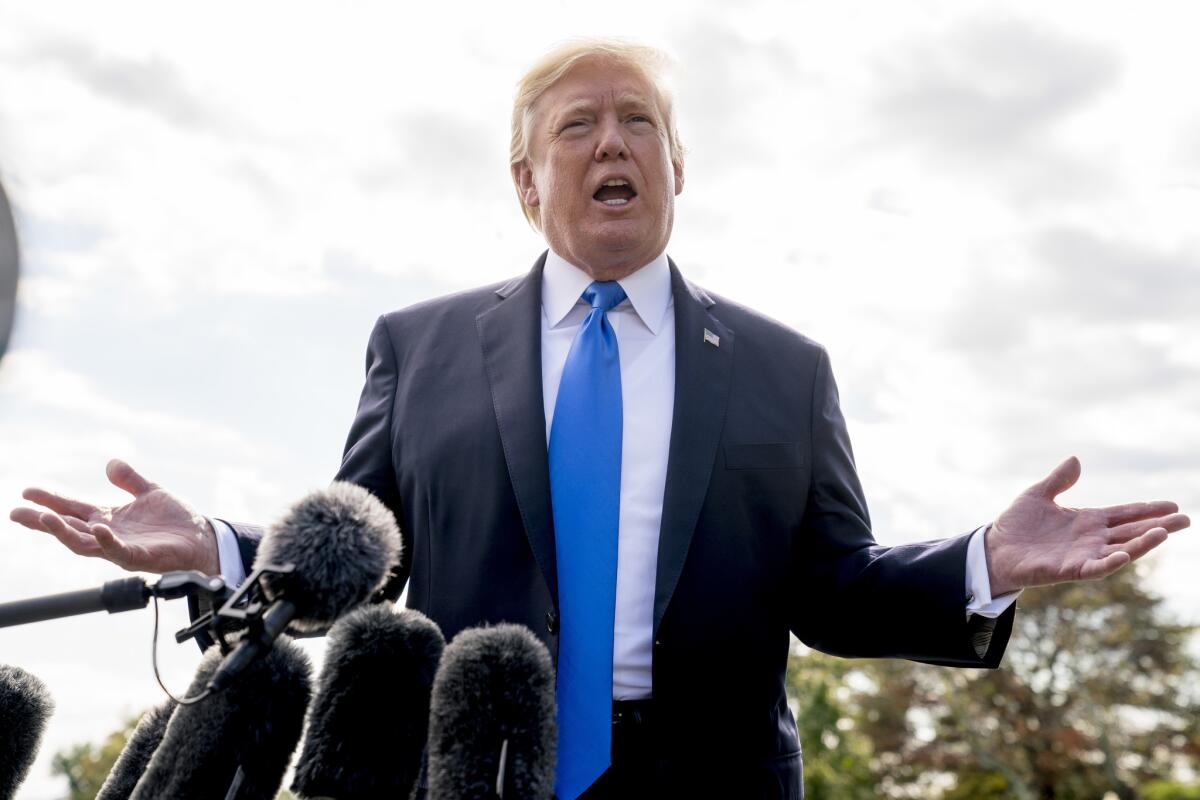
President Trump said Wednesday he would “love” to make an immigration deal to protect so-called Dreamers, but wants border security concessions in exchange, including money to build his long-promised wall along the border with Mexico.
“I’d love to do a DACA deal, but we have to get something very substantial for it, including the wall” and tougher border security, Trump told reporters as he left the White House to fly to Dallas for a GOP fundraiser and a briefing on Gulf Coast hurricane relief efforts.
Trump announced in September he was terminating the Deferred Action for Childhood Arrivals program established by President Obama that has protected from deportation more than 800,000 people brought to the country illegally as children.
At the time, Trump gave Congress six months to act before work permits and deportation deferrals issued under the program begin to expire on March 6.
But lawmakers have struggled to agree on how to move forward with a bill to protect the DACA recipients. They’re currently negotiating with an eye toward including a compromise on the issue as part of a must-pass spending bill due for a vote in early December.
The top Democrats in the House and Senate, Rep. Nancy Pelosi (D-San Francisco) and Sen. Charles E. Schumer (D-N.Y.), said Trump made a deal with them during an Oval Office meeting in early September that he would sign a DACA bill that didn’t include funding for the wall.
Earlier this month, however, the White House issued a 17-page list of principles for any deal that included building the wall, increasing the number of deportation officers, and provisions that would limit the ability of new U.S. citizens to sponsor relatives for legal status.
- Share via
Trump adds fresh doubts to his promise to declare opioid emergency
President Trump surprised his advisors last week when he promised that he would declare an opioid emergency by this week. On Wednesday, he added to the confusion.
Speaking to reporters at the White House, Trump hedged his language on when he would declare a state of emergency and fueled doubts about the amount of legal force he will put behind the declaration.
“We’re going to have a big meeting on opioids tomorrow,” he said during an ad hoc news conference on the White House lawn as he set out for a fundraising trip to Texas.
The session would be “a very, very important meeting,” Trump said, adding that an emergency would be declared “sometime in the very short, very near future.”
Trump promised last week that the emergency would be declared this week. He made a similar promise of rapid action in August, after his high-profile opioid commission made declaration of an emergency a top recommendation.
But the White House has been slow to act, leading to questions over how much power an actual declaration will carry in freeing up money or adding to the government’s authority to regulate.
Since the opioid commission released its report, Trump’s secretary for Health and Human Services, Tom Price, has stepped down and his pick for drug czar, Rep. Tom Marino (R-Pa.), withdrew his nomination.
- Share via
Trump: Flake was ‘against me from before he ever knew me’
- Share via
In stunning rebuke of Trump, two GOP senators accuse him of undermining American values
President Trump on Tuesday endured one of the most searing rebukes of a chief executive by members of his own party in modern history, with one Republican senator accusing him of “debasing” the nation and another declaring he would rather retire than be “complicit” in the “compromise of our moral authority.”
Senate Republicans had hoped a Tuesday lunch with Trump would showcase GOP unity as they push for tax cuts. But the meeting was largely lost amid Trump’s remarkable war of words with Sen. Bob Corker of Tennessee, the chairman of the Senate Foreign Relations Committee, and the announcement by Arizona Sen. Jeff Flake that he would not run for reelection because he refuses to accommodate the “new normal” of the president’s behavior.
The successive attacks, one before senators even sat down for lunch and the other afterward, showed once again how the president’s unpredictable outbursts and willingness to belittle his allies not only distracts from the administration’s policy agenda, but also threatens to undercut Trump’s image at home and abroad.
- Share via
Trump makes fundraising trip to Dallas, with hurricane briefing -- far from coast -- on the side
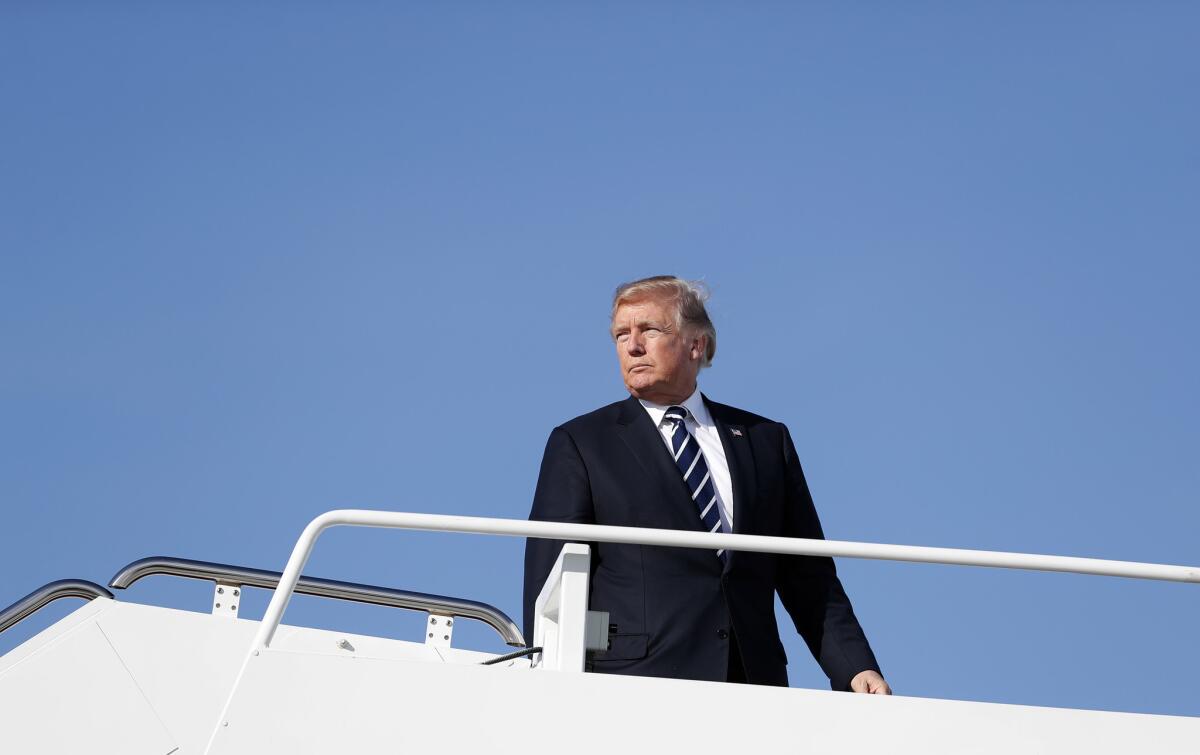
President Trump visited Dallas on Wednesday for a Republican fundraiser and political reception, and added a brief meeting about hurricane recovery efforts continuing on the Gulf Coast about 250 miles away.
The briefing at Dallas Love Field Airport, where several state and federal officials reviewed the effort since Hurricane Harvey struck the Houston region in August, lasted just 10 to 15 minutes, according to reporters with the president. Afterward Trump attended a private roundtable event and reception with Republican National Committee supporters and donors.
The reception was held at the Belo Mansion, now a catering and event space that once was the home of Alfred Horatio Belo, who led Confederate troops at the Battle of Gettysburg and later helped found the Dallas Morning News. It was expected to raise $4 million from about 200 people who paid from $2,700 a person up to $100,000 a couple, Republican officials said.
Republican Gov. Greg Abbott attended the hurricane relief meeting and the reception, which comes during a week when Trump’s conduct in office was criticized by three Republican senators, as well as former President George W. Bush, who lives in Dallas.
The fundraising events were initially scheduled for September but were delayed after the hurricane. Dallas, however, was not affected by the storm given its distance from the coast. Trump last visited the coastal area seven weeks ago.
Scheduling an official event like the hurricane briefing on top of the fundraising events allows the White House to split the cost of Trump’s trip between taxpayers and the Republican Party, a practice that past presidents adopted as well.
This article was updated after Trump’s arrival.
- Share via
Legal battle ends: Detained immigrant obtains an abortion

The first legal battle over abortion in the Trump administration ended Wednesday when a 17-year-old immigrant from Central America had an abortion in south Texas.
The U.S. appeals court in Washington ruled Tuesday that administration officials could not prevent her from obtaining the abortion with the help of a legal guardian.
The Trump administration did not attempt to fight the legal battle further.
But the action does not settle the larger legal question of whether officials at the Office of Refugee Resettlement can stand in the way of detained young women who wish to terminate their pregnancies. Administration lawyers said the only option for pregnant minors in detention was to accept deportation to their home countries.
Brigitte Amiri, an ACLU attorney, predicted further legal fights.
“Justice prevailed today for Jane Doe. But make no mistake about it, the administration’s efforts to interfere in women’s decisions won’t stop with Jane,” she said.
Attorneys issued a statement from the young woman.
“I made my decision and that is between me and God. Through all of this, I have never changed my mind,” she said.
- Share via
Sen. Jeff Flake: ‘You can’t continue to just remain silent’
Republican Sen. Jeff Flake, invoking the 1950s demagoguery of Sen. Joseph McCarthy, said Wednesday “you can’t continue to just remain silent” about President Trump’s politics and behavior.
“There is a tipping point. ... I hope we’re reaching that tipping point,” Flake told NBC’s “Today.”
The Arizona senator made the rounds of morning television news shows to talk about his decision not to run for reelection in 2018 and his impassioned speech on the Senate floor Tuesday, in which he said he could no longer be “complicit” with the Republican president.
“We are excusing undignified and outrageous and reckless speech and behavior as ‘telling it like it is.’ ... That’s not right,” Flake said Wednesday on MSNBC.
Trump immediately fired back on Twitter, saying that Flake and another retiring Senate Republican, Bob Corker of Tennessee — who had criticized Trump on Tuesday as “untruthful” and debasing the nation — aren’t running for reelection because “they had zero chance of being elected.”
He also contended that Flake and Corker stand alone, boasting in several tweets that he had gotten standing ovations at a Senate Republicans’ luncheon Tuesday at the Capitol.
Flake cited the era of McCarthy, the Republican senator from Wisconsin whose smear tactics alleging communist infiltration ultimately led to his censure. In an op-ed column in the Washington Post, Flake quoted Joseph Welch, an Army lawyer, who stood up to McCarthy in a June 1954 hearing and demanded: “Have you no sense of decency, sir?”
“The moral power of Welch’s words ended McCarthy’s rampage on American values, and effectively his career as well,” Flake wrote. “We face just such a time now. We have again forgotten who we are supposed to be.”
Flake also said he thinks more of his Republican colleagues will speak out.
“It’s up to us to stand us and say, ‘This is not acceptable,’” he told ABC’s “Good Morning America.”
Asked why others in his party haven’t yet done so, Flake said, “There is some fatigue about it.”
Flake stopped short of saying Trump should be declared unfit for office or impeached.
“The voters made their choice,” Flake said. “He was elected fair and square.”
- Share via
Clinton’s campaign helped fund research that led to Trump dossier on ties to Russia, source says
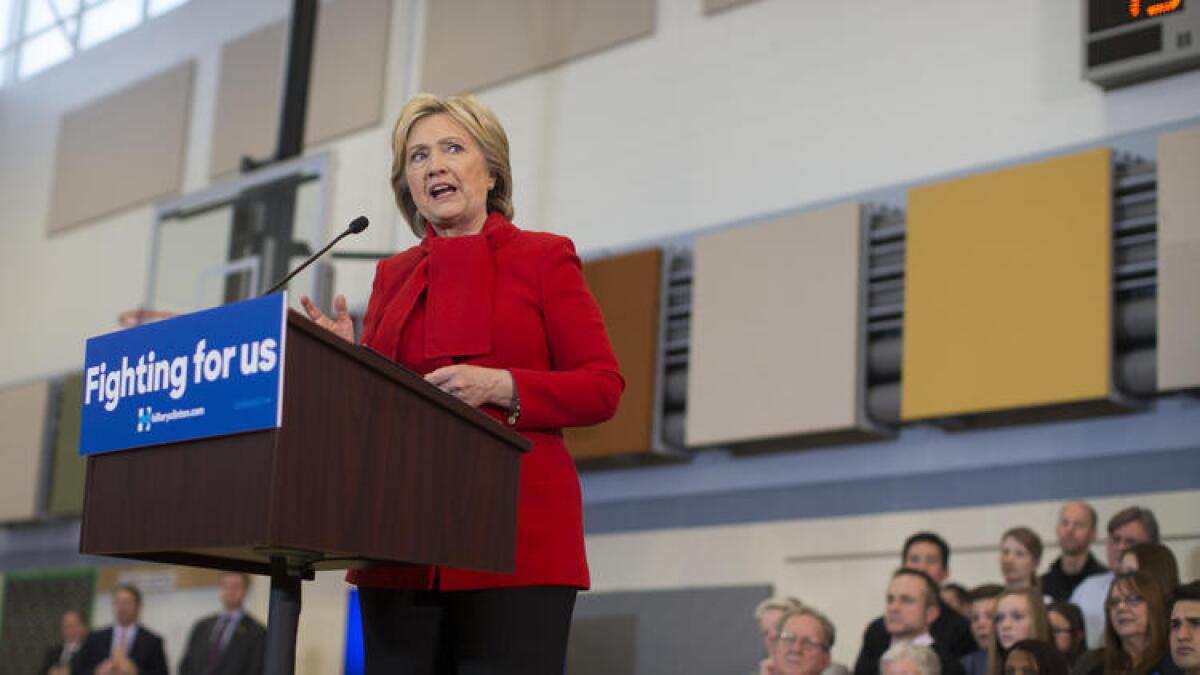
Hillary Clinton’s presidential campaign and the Democratic National Committee helped fund political research into President Trump that ultimately produced a dossier of allegations about his ties to Russia, a person familiar with the matter said Tuesday night.
The revelation is likely to fuel complaints by Trump that the dossier, which the president has derided as “phony stuff,” is a politically motivated collection of salacious claims. Yet the FBI has worked to corroborate the document, and in a sign of its ongoing relevance to investigators, special counsel Robert Mueller’s team — which is probing potential coordination between Russia and the Trump campaign — weeks ago questioned the former British spy, Christopher Steele, who helped compile the claims in the dossier.
The dossier, which circulated in Washington last year and was turned over to the FBI for its review, contends that Russia was engaged in a long-standing effort to aid Trump and had amassed compromising information about him. Trump has repeatedly dismissed the document as false and in recent days has questioned on Twitter whether Democrats or the FBI had helped fund it.
- Share via
Senate votes to kill new rule allowing class-action lawsuits against banks after Pence casts deciding vote
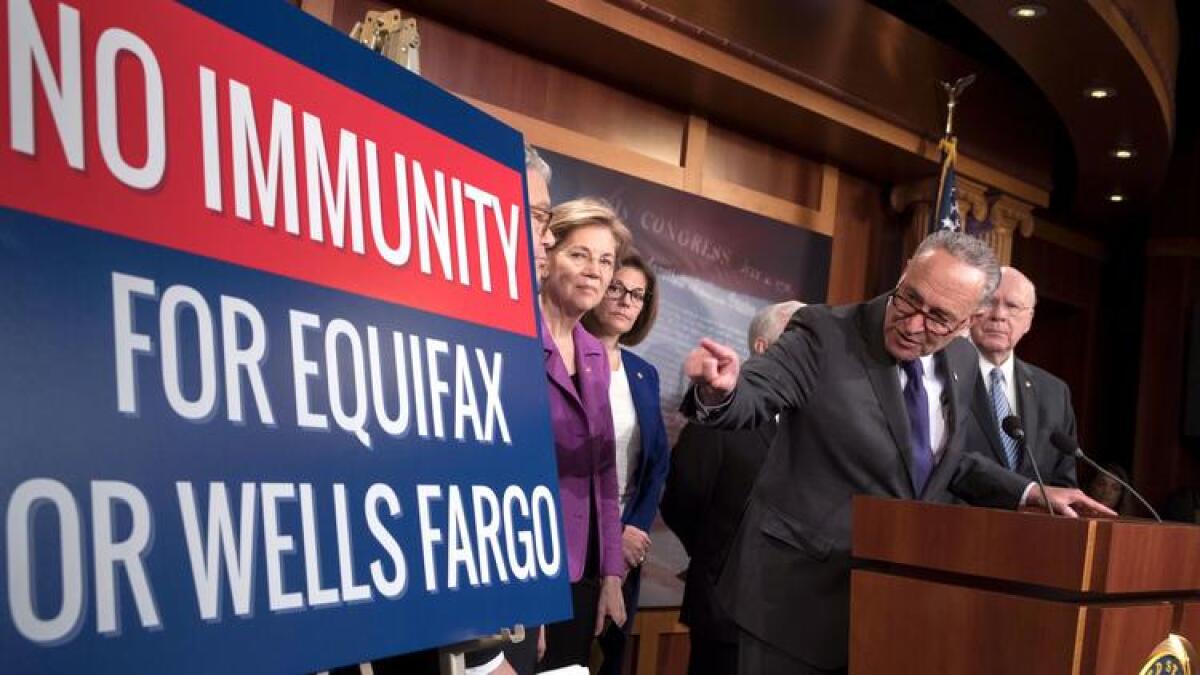
The Senate voted Tuesday night to kill a controversial rule that would have allowed Americans to file class-action suits against banks instead of being forced in many cases into private arbitration.
The move by the Senate followed a similar action by the House in July to rescind the rule. President Trump is expected to sign the repeal legislation, providing a major victory for the financial industry.
Vice President Mike Pence cast the deciding vote after the Senate tied 50-50. All but two Republicans — John Kennedy of Louisiana and Lindsey Graham of South Carolina — voted to repeal the rule. No Democrats or independents supported the move.
The White House said Trump “applauds” Congress for voting to repeal the rule, which would have given consumers “fewer options for quickly and efficiently resolving financial disputes.”
- Share via
Read Sen. Jeff Flake’s speech announcing he will not seek reelection: ‘I rise today to say: Enough’
Mr. President, I rise today to address a matter that has been much on my mind, at a moment when it seems that our democracy is more defined by our discord and our dysfunction than it is by our values and our principles. Let me begin by noting a somewhat obvious point that these offices that we hold are not ours to hold indefinitely. We are not here simply to mark time. Sustained incumbency is certainly not the point of seeking office. And there are times when we must risk our careers in favor of our principles.
Now is such a time.
- Share via
Congress approves $36.5-billion disaster aid for Puerto Rico, wildfires and hurricane relief
Congress gave final passage Tuesday to $36.5 billion in disaster aid for Puerto Rico and several states impacted by a particularly destructive hurricane season.
The package includes $576.5 million to address the devastating wildfires in California and the West.
It is the second – but not likely final – allotment of emergency funds after a succession of deadly hurricanes battered Texas, Florida and other Southern states. It is the first allotment for Puerto Rico.
Approval arrives amid criticism of President Trump’s uneven response to the island, which remains largely without electricity, and where food and potable water remain scarce more than a month after Hurricane Maria. Congress had approved $15 billion in the aftermath of Hurricane Harvey.
The vote, 82-17, follows earlier passage in the House. Trump is expected to swiftly sign it into law.
Passage was not always guaranteed amid opposition from conservatives. The package includes $18.7 billion to replenish the Federal Emergency Management Agency’s main Disaster Relief Fund, $16 billion to shore up the National Flood Insurance Program and $1.2 billion for nutrition assistance and the wildfire funds. Conservatives balked at what they called a “bailout” for the flood insurance program, which faces a continual shortfall and has been targeted for reforms.

- Share via
Arizona Sen. Jeff Flake denounces Trump, announces he will not seek reelection in 2018
Arizona Sen. Jeff Flake said Tuesday that he will not seek reelection in 2018, declaring he needs political independence to criticize President Trump.
“I have children and grandchildren to answer to, and so Mr. President, I will not be complicit or silent,” Flake declared in a dramatic Senate speech.
“Reckless, outrageous and undignified behavior” that “emanates from the top of our government.. is dangerous to a democracy,” he said.
“I rise today to say enough,” Flake added. “We did not become great by calling true things fake.”
Flake was already involved in a sharp battle with Trump that had prompted a Republican challenger to enter the race against him
Earlier, Flake told the Arizona Republic about his plan to serve out the remainder of his term but avoid a reelection campaign.
“There may not be a place for a Republican like me in the current Republican climate or the current Republican Party,” Flake told the newspaper.
Flake had been beset from both sides as he sought reelection: from Republicans loyal to President Trump who resented his criticism of the commander in chief, and from Democrats angered by his votes for Trump’s policy desires.
“This spell will pass, but not by next year,” Flake told the Republic.
12:39 p.m.: This post was updated with quotes from Flake’s Senate speech.
- Share via
House Republicans to investigate Obama-era uranium deal
House Republicans are opening investigations of the Obama administration’s 2010 decision to approve the sale of American uranium mines to a Russian-backed company, lawmakers said Tuesday.
Rep. Devin Nunes (R-Tulare), the chairman of the House Intelligence Committee, said at a news conference that his panel and the House Oversight Committee would jointly probe the deal, which President Trump has called “the real Russia story.”
Nunes and other Trump supporters have raised the 7-year-old uranium deal while four congressional committees and Special Counsel Robert S. Mueller III are looking into Russia interference the 2016 election and whether Moscow had any direct links to the Trump campaign.
Nunes said the House probe would focus initially on whether the the FBI or Justice Department had investigated attempts by Russian officials to gain influence over the American energy industry.
“This is just the beginning of the probe,” Nunes told reporters. “We’re not going to jump to any conclusions at this time.”
The House probe of the uranium deal parallels a Senate Judiciary Committee probe into whether the FBI had evidence that Russian nuclear officials were involved in fraudulent dealings in 2009 before the uranium deal was approved.
In April, Nunes stepped away from leading the House Intelligence Committee probe of Russian interference in the 2016 election after the House Ethics Committee said it was investigating whether he had improperly disclosed classified information.
But he and his staff have used his chairmanship to push parallel investigations aimed at Trump’s opponents and critics, including Fusion GPS, the political research firm behind a unverified dossier of allegations about Trump’s ties to Russia.
Trump and his supporters frequently cite the 2010 purchase of Uranium One by Rosatom, a Russian-run company, as a counter to questions about Russian support for Trump’s presidential bid.
The sale was approved while Hillary Clinton led the State Department and some investors in the U.S. company had relationships with former President Clinton and had donated to the Clinton Foundation.
The State Department was one of nine U.S. departments or agencies that approved the sale.
Clinton’s presidential campaign and former State Department officials said she was not involved in the approval process by the Committee on Foreign Investment in the United States, a government panel charged with examining foreign acquisitions of U.S. companies.
Republicans have tried to link Clinton to the deal, citing Canadian financier Frank Giustra, a top Clinton Foundation donor.
He sold his company, UrAsia, to Uranium One, which was chaired by Ian Telfer, also a Clinton Foundation donor. Giustra has said he sold his stake in the deal in 2007, while Clinton was competing with Barack Obama for the Democratic presidential nomination.
------------
For the record
12:48 p.m.: An earlier version of this post identified Rep. Devin Nunes as chairman of the Senate Intelligence Committee. He is chairman of the House Intelligence Committee.
------------
- Share via
The feud between Trump and Sen. Bob Corker explodes ahead of president’s visit
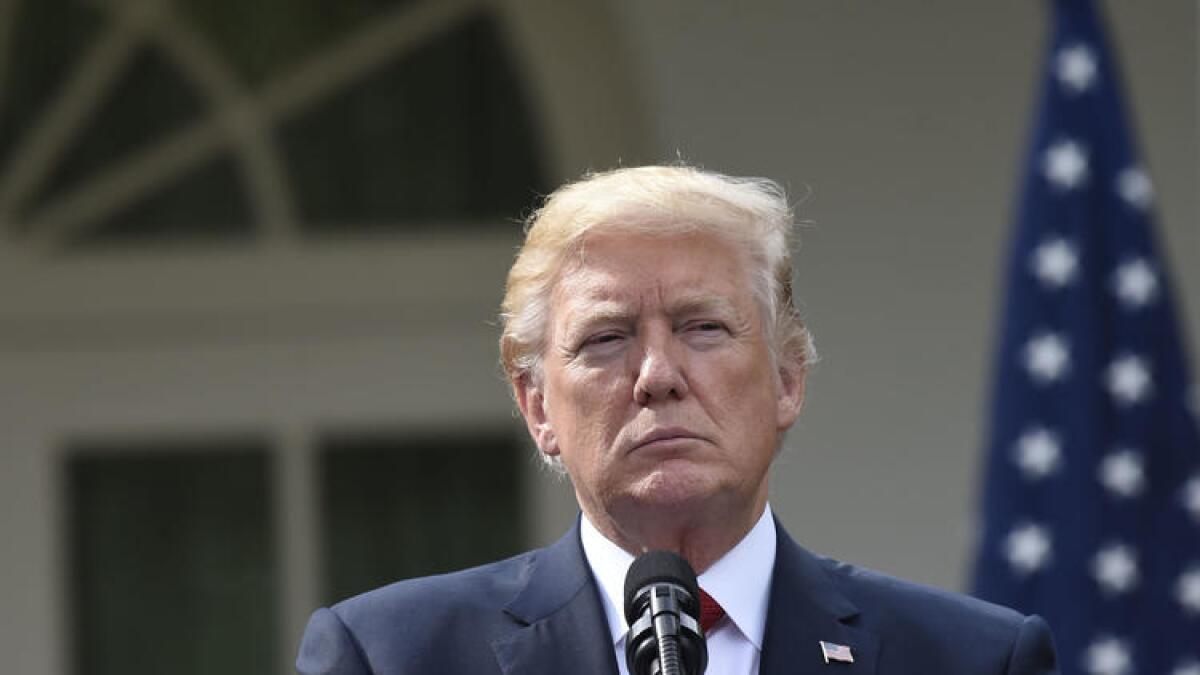
President Trump will visit Senate Republicans for lunch Tuesday, arriving on the Capitol Hill turf of some of his most powerful GOP critics as he pushes Congress to swiftly act on his tax cut proposal.
Trump has a mixed record from his forays to Capitol Hill. His visit to House Republicans during the healthcare debate failed to inspire passage on their initial attempts at an Obamacare overhaul. When he invited senators to lunch at the White House, he not-so-lightly threatened those who dared oppose him on healthcare with their jobs.
On Tuesday, Trump will need to appeal to some of his most vocal critics to find common ground on their shared priority of passing what he calls the biggest tax cuts in history. This will be his first trip as president to a Senate Republican lunch.
Among Trump’s top critics is Tennessee Sen. Bob Corker, who, in an interview on “Today,” downplayed Trump’s visit.
“I think it’s fine for him to come over. I do look at these things as more of a photo op,” Corker said. “They’re not really about substance, but more power to him.”
Trump responded on Twitter, mocking Corker as someone who could not get elected “dog catcher.”
The two went back and forth on Twitter, with Corker using a hashtag citing previous comments he made about the White House becoming an “adult day-care center.”
Corker had more to say in an interview with press ahead of the meeting.
- Share via
Nation’s top general says U.S. troops in Niger were ambushed on way back to base

The nation’s top general outlined the investigation Monday into the ambush that killed four U.S. servicemen in the African country of Niger on Oct. 4, and provided new details on the attack.
Gen. Joseph F. Dunford Jr., chairman of the Joint Chiefs of Staff, acknowledged that aspects of the attack were still unclear as well as the perception that the Pentagon had not been forthcoming on the deadliest combat incident since President Trump took office.
His comments came the same day that the widow of an Army sergeant killed in the attack publicly said Trump had “made me cry even worse” in a condolence phone call when, she said, he didn’t know her husband’s name.
“We owe the families as much information as we can find out about what happened, and we owe the American people an explanation of what their men and women were doing at this particular time,” Dunford told reporters at the Pentagon.
Sketching out the timeline of the attack, Dunford said a dozen U.S. soldiers and 30 Nigerien troops embarked Oct. 3 on a “reconnaissance mission” to the village of Tongo Tongo, near the border with Mali.
“The assessment by our leaders on the ground at that time was that contact with the enemy was unlikely,” he said.
The next morning, the soldiers were returning to their base when they were hit with machine-gun fire and rocket-propelled grenades. One hour after taking fire, the Americans radioed a request for air support.
A reconnaissance drone appeared “within minutes,” Dunford said. An hour later, French Mirage fighter jets and helicopter gunships arrived on the scene because the Pentagon does not have attack warplanes in the region.
During the firefight, two U.S. soldiers were wounded and evacuated by the French. Three U.S. soldiers were killed and were evacuated by a military contractor aircraft that night.
One other soldier, Sgt. La David Johnson, was still missing. His body wasn’t found until two days later.
“Now many of you have asked a number of questions, and many of them are fair questions, and we owe you more information,” Dunford said. “More importantly, we owe the families of the fallen more information, and that’s what the investigation is designed to identify.”
Dunford said the questions included: Did the mission of U.S. forces change during the operation? Did U.S. forces have adequate intelligence, equipment and training?
Was a pre-mission assessment of the threat accurate? How did U.S. forces become separated during the engagement and how did they lose contact with Sgt. Johnson? And why did they take time to find and recover his body?
Dunford’s briefing came after Myesha Johnson, the sergeant’s widow, made her first public comments during an interview on ABC’s “Good Morning America.”
“I don’t know how he got killed, where he got killed or anything,” she said. “I don’t know that part. They never told me, and that’s what I’ve been trying to find out since Day One.”
The pregnant mother of two children said Trump’s subsequent call had upset her further: “I was very angry at the tone of his voice and how he couldn’t remember my husband’s name.”
Trump tweeted after the interview had aired: “I had a very respectful conversation with the widow of Sgt. La David Johnson, and spoke his name from beginning, without hesitation!”
- Share via
Tillerson makes unannounced stops in Kabul, Baghdad
Under cloak of secrecy, Secretary of State Rex Tillerson visited two war-zone capitals Monday to reaffirm Washington’s desire for stability in Iraq and Afghanistan.
Tillerson traveled first to Kabul, Afghanistan, and later to Baghdad, Iraq. The State Department had not announced either trip in advance, and his visit was bracketed in heavy security out of fear of possible attack.
In the Iraqi capital, where people still celebrated having driven Islamic State militants out of large parts of the country, Tillerson urged the central government and Kurdish-dominated areas to reconcile their differences.
Kurdish militias played a key role in the war against Islamic State in northern Iraq and now seek an independent state, which Baghdad vehemently opposes.
“We are concerned and a bit sad,” Tillerson said after meeting with Iraqi Prime Minister Haider Abadi at a heavily fortified government facility late Monday.
“We have friends in Baghdad and friends in [the Kurdish capital] Irbil and we encourage all parties to enter into discussion,” he said.
The Trump administration has sided with Abadi in opposing the Kurdish bid for independence and rejecting the Kurds’ recent referendum in favor of the issue. The administration says it wants to see a “unified, democratic” Iraq.
Abadi may have dealt a setback to Tillerson, saying that the so-called Popular Mobilization fighters, which the U.S. considers undesirable proxies of Iran, are “part of our Iraqi institutions” who should be “encouraged.”
“They will be the hope of country and the region,” Abadi said.
Tillerson did not respond but had earlier called for Iranian-backed fighters to be expelled from Iraq.
Earlier in Kabul, Tillerson said the Trump administration was willing to engage “moderate” Taliban officials to reach a political solution to end America’s longest war.
- Share via
John McCain vs. President Trump: Draft dodgers, bone spurs and Vietnam War
Sen. John McCain never mentioned President Trump in criticizing the Vietnam War-era draft system that allowed the wealthy and connected to avoid military service.
But the Arizona senator didn’t have to as he blasted “bone spur” medical deferments, which Trump used to avoid service during the war.
“We drafted the lowest-income level of America, and the highest income level found a doctor that would say that they had a bone spur,” McCain said in an interview Sunday on C-SPAN’s “American History” program. “That is wrong. That is wrong. If we’re going to ask every American to serve, every American should serve.”
Trump and McCain have never much bonded, ever since then-candidate Trump mocked the former fighter pilot, who was held in captivity for nearly five years as a prisoner of war in Vietnam, scoffing that he preferred “people who weren’t captured.”
McCain, who tried and failed twice to become president, and is now battling brain cancer, has emerged as one of the president’s most outspoken Republican critics.
Asked on Monday if he meant Trump was a draft-dodger, McCain explained he was criticizing the draft as “one of the great inequities of the Vietnam conflict.”
“I don’t consider him so much a draft dodger as much as I feel that the system was so wrong that certain Americans could evade their responsibilities to serve the country, “ he said during an appearance, alongside his daughter, Meghan, on “The View.”
- Share via
Analysis: Kelly might not be like Trump, but he seems like many Trump voters
In the roughly three months since President Trump chose John F. Kelly as his second chief of staff, observers have puzzled over the retired Marine general’s occasional scowls and downcast gazes, wondering whether he and Trump, with such different styles and backgrounds, perhaps weren’t working well together.
Kelly, the military man trained to respect sharp lines of authority and tradition, uses terms like “information flow” to describe the discipline he tries to bring to a chaotic White House. Trump, the impulsive businessman and reality-show veteran, delights in flouting authority and upending norms of the presidency.
But Kelly’s extraordinary remarks on Thursday from the White House briefing room, in which he segued from defending Trump to speak of loss — both his own, of a son, and the country’s, of old civilities, all while attacking a Florida congresswoman — offered a glimpse of what the two men seem to share. Both hark back to an undefined time in America when some things were “sacred,” as Kelly put it, to a better moment that’s been lost.
- Share via
Watch live: President Trump’s joint statement with Singapore’s prime minister, Lee Hsien Loong
- Share via
Trump vows ‘no change’ to 401(k) rules in Republican tax bill
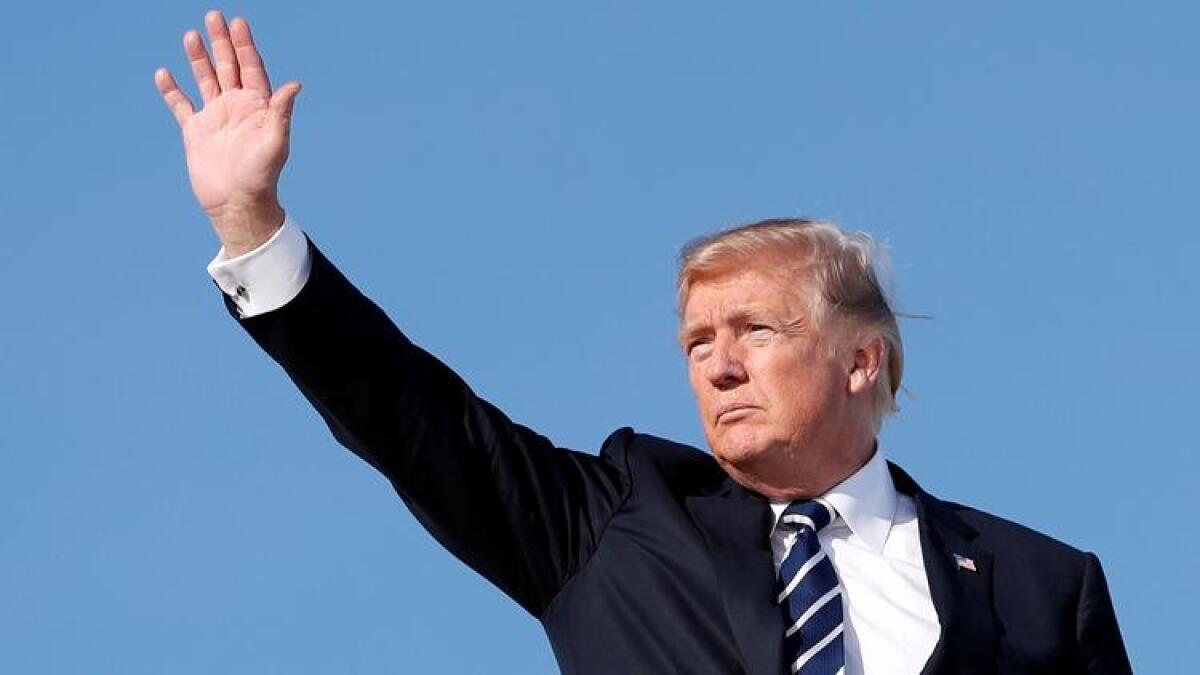
President Trump on Monday vowed there would be “no change” to rules for 401(k) plans, seeking to douse speculation that the Republican tax overhaul bill being drafted by Congress would include new limits on retirement savings.
“This has always been a great and popular middle class tax break that works, and it stays!” Trump said on Twitter.
The outlines of the tax overhaul released by the White House and Republican leaders last month said that “[t]ax reform will aim to maintain or raise retirement plan participation of workers and the resources available for retirement.”
Lawmakers are drafting legislation based on the framework, which is centered around a large cut to the corporate tax rate, other breaks that would benefit the wealthy and mostly unspecified promises of helping reduce taxes for the middle class.
But there have been reports that Republicans in Congress are weighing new limits on the upfront tax break for 401(k) savings as a way of generating additional federal revenue to offset money lost by the rate cuts and other proposed changes.
The New York Times reported Friday that House Republicans were considering placing a cap of as low as $2,400 on the annual amount that workers can put into their 401(k) accounts to defer tax payments until they tap the savings in retirement.
The current limit is $18,000, and it rises to $24,000 a year for people over 50 years old to encourage them to save more for retirement.
- Share via
Immigrant abortion case heads back to court
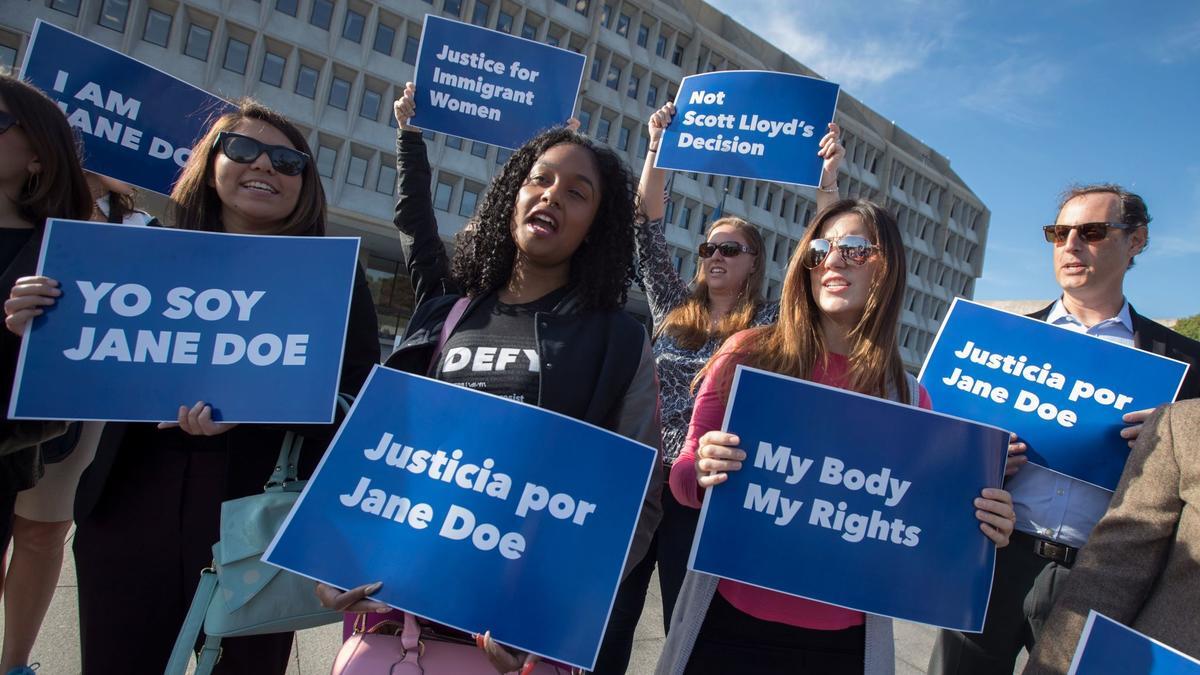
The ACLU asked a federal appeals court Sunday night to reenter the case of a 17-year-old pregnant immigrant in detention whose request for an abortion has been blocked by federal officials.
The woman, identified in court as Jane Doe to protect her privacy, has been held in a federal detention center in south Texas since crossing the border illegally in September.
She is 15 weeks pregnant and has been seeking an abortion for several weeks. She got approval from a Texas state judge, which the state’s law requires for minors who don’t have a parent’s permission for the procedure.
But under policies adopted by the Trump administration, federal officials have tried to block any pregnant minors held in immigrant detention from getting abortions. E. Scott Lloyd, the head of the federal refugee agency that oversees detention centers for minors, is a long-time antiabortion activist, and he has refused to allow Doe to leave the detention center to go to an abortion clinic.
- Share via
Tillerson makes unexpected trip to Afghanistan

Secretary of State Rex Tillerson made a surprise trip to Kabul, Afghanistan, on Monday and pledged to engage “moderate” Taliban officials to build peace in the country.
Tillerson said the site of America’s longest war was key to denying terrorists refuge and that the Trump administration was committed to forging a democratic, unified Afghanistan through a regional approach.
The U.S. will continue to fight the Taliban, he said, but will also reach out to “moderate voices among the Taliban, voices that do not want to continue to fight forever.”
Tillerson met at the Bagram Air Field with Afghan President Ashraf Ghani, Chief Executive Officer Abdullah Abdullah and other officials.
On Tuesday, Tillerson is scheduled to continue his tour of the region, arriving in Islamabad, Pakistan, where the government is being told it must destroy safe havens for militants or risk losing U.S. aid.
“Pakistan needs to, I think, take a clear-eyed view of the situation that they are confronted with in terms of the number of terrorist organizations that find safe haven inside of Pakistan,” Tillerson said.
The stop in Kabul had not been announced. Reporters traveling with Tillerson were not told where they were going until the last minute.
- Share via
Bowe Bergdahl faces life in prison during sentencing hearing on desertion charges

Army Sgt. Bowe Bergdahl is set to appear Monday before a military judge who will determine his punishment for endangering comrades by walking off his post in Afghanistan. Before delivering his sentence, the judge will have to resolve a last-minute defense argument that new comments by President Trump have tainted the case.
Bergdahl faces up to life in prison after pleading guilty last week to desertion and misbehavior before the enemy. Prosecutors made no deal to cap his punishment, so the judge has wide leeway to decide his sentence after a hearing expected to take several days.
The judge, Army Col. Jeffery R. Nance, is expected to weigh factors including Bergdahl’s willingness to admit guilt, his five years of captivity in the hands of the Taliban and its allies, and the serious wounds that several service members suffered while searching for him.
Prosecutors are expected to put on evidence or testimony about soldiers and a Navy SEAL who were seriously wounded by gunfire during these search missions, including an Army National Guard sergeant who was shot in the head, suffering a traumatic brain injury that put him in a wheelchair, unable to speak.
- Share via
Widow of Sgt. La David Johnson: Trump ‘couldn’t remember my husband’s name’
In a phone call with the widow of Sgt. La David Johnson, President Trump stumbled to remember her husband’s name, according to Myeshia Johnson, who spoke to ABC’s “Good Morning America” on Monday.
“It made me cry because I was very angry at the tone of his voice and how he said it,” Johnson said.
Sgt. Johnson was killed earlier this month along with three other soldiers during an ambush on a special forces patrol in Niger, an attack apparently carried out by militants affiliated with Islamic State.
Florida Rep. Frederica Wilson, a Florida Democrat and family friend who was listening in on the call, has been fighting with Trump over what was said and whether it was insensitive. Johnson’s account backs that of Wilson, whom Trump accused of fabricating the story.
Rather than leave the matter alone, Trump responded to the interview on Twitter, saying he had a “very respectful” conversation with Johnson. Contradicting her, he added, “and spoke his name from beginning, without hesitation!”
The controversy threatens to overshadow an afternoon White House ceremony in which Trump will award the Medal of Honor to Retired Army Captain Gary Michael “Mike” Rose, a Vietnam War medic.
- Share via
McCain issues veiled criticism of Trump’s Vietnam War deferment
Sen. John McCain has issued a veiled criticism of President Trump’s medical deferments that kept him from serving in the Vietnam War.
In an interview with C-SPAN last week, McCain lamented that the military “drafted the lowest income level of America and the highest income level found a doctor that would say they had a bone spur.”
One of Trump’s five draft deferments came as a result of a physician’s letter stating he suffered from bone spurs in his feet. Trump’s presidential campaign described the issue as a temporary problem.
McCain spent six years as a prisoner of war after his plane was shot down over North Vietnam in 1967.
Trump derided McCain’s service in 2015, stating his fellow Republican wasn’t a “war hero” and adding “I like people who weren’t captured.”
McCain’s spokeswoman didn’t immediately return a request for comment Monday.
- Share via
Trump’s promise on tax cuts: ‘NO change to your 401(k)’
President Trump pledged Monday morning via Twitter that there would be no changes to the 401(k) retirement savings plans as Republicans in Congress pursue an overhaul of the tax code.
Actual text of a tax overhaul bill hasn’t been written, much less become public. Members of Congress haven’t reached consensus on what cuts to make or where to make them. Trump signaled that tweaks are still being made.
On Sunday, Trump raised expectations about the timetable for completing tax reform, indicating that he expects the as-yet unwritten overhaul of the tax code on his desk by Thanksgiving.
“I want to get it by the end of the year, but I’d be very disappointed if it took that long,” he said on Fox’s “Sunday Morning Futures With Maria Bartiromo.” He said lawmakers should forgo their Thanksgiving break if they can’t send him a measure by then.
The tax plan Republican leaders and the White House have laid out calls for reducing tax rates on corporations from 35% to 20%, and consolidating individual tax rates to 12%, 25%, 35% and possibly one higher bracket for the wealthy. Income brackets for those rates have yet to be set.
- Share via
EPA cancels appearance of scientists at Rhode Island event
The Environmental Protection Agency has canceled the appearance of three scientists at an event on Monday in Rhode Island where they had been scheduled to discuss a report that deals in part with climate change.
EPA spokesman John Konkus confirmed Sunday that agency scientists would not be speaking at the event in Providence, according to the New York Times. Konkus did not provide an explanation.
The event is designed to draw attention to the health of Narragansett Bay, which forms New England’s largest estuary.
A spokesman for Sen. Jack Reed (D-R.I.) said the event will go on as planned and the report that EPA scientists helped work on will be released.
In a statement to the Associated Press on Sunday, Reed said that “muzzling EPA scientists won’t do anything to address climate change.”
- Share via
Four female senators tell their #MeToo stories
Four female U.S. senators shared stories of sexual harassment Sunday on NBC’s “Meet the Press.”
Claire McCaskill (D-Mo.), Mazie Hirono (D-Hawaii), Elizabeth Warren (D-Mass.) and Heidi Heitkamp (D-N.D.) told stories of crude comments by colleagues or co-workers trying to touch them.
The interviews came on the heels of a social media outcry that sprung up following allegations of sexual harassment by Hollywood producer Harvey Weinstein. Actress Alyssa Milano requested on Twitter that women tell their stories of sexual harassment or assault with the hashtag #MeToo, and variations have taken hold in countries around the world.
“The first women who started the “me, too” campaign were incredibly brave,” Warren said. “And they inspired the next wave. And in turn, they inspired the next wave and the next wave and the next wave. That’s how we make real change.”
- Share via
McConnell says he’ll bring the bipartisan Affordable Care Act fix up for a vote if Trump backs it
Senate Majority Leader Mitch McConnell said he’s waiting to hear if President Trump will support a proposed bipartisan healthcare fix before bringing the measure up for a vote.
The plan to fix parts of the Affordable Care Act and stabilize health insurance markets is backed by 12 Republican and 48 Democratic senators. It would reinstate federal payments to insurers that Trump cut off this month, offering millions of Americans some relief from rising premiums and shaky insurance markets. It would also give states some new flexibility to offer cheaper, less generous health plans.
“If there is a need for some kind of interim step here to stabilize the market, we need a bill the president will actually sign,” McConnell (R-Ky.) said on CNN’s “State of the Union.” “And I’m not certain yet what the president is looking for here, but I’ll be happy to bring a bill to the floor if I know President Trump would sign it.”
Trump has given conflicting signals on whether he will support the compromise worked out by Senate Health Committee Chairman Lamar Alexander, a Republican from Tennessee, and the committee’s senior Democrat, Sen. Patty Murray of Washington.
On NBC’s “Meet the Press,” Senate Minority Leader Charles E. Schumer (D-N.Y.) said the plan, with the support of 60 senators, should be brought up immediately. “We should pass it and pass it now,” Schumer said.
- Share via
Trump tweets he’ll authorize release of JFK assassination files
President Trump tweeted Saturday morning that pending more information, he plans to allow the release of classified files related to the November 1963 assassination of President John F. Kennedy.
Several media outlets had reported in recent days that White House officials expected the president to block the release of thousands of classified files as security agencies voiced concerns that sensitive documents could be included if the full trove of more than 3,000 files is released.
The tweet didn’t specify whether the president intends to allow all, or just some, of the information to become public, and he stipulates that the decision is “subject to the receipt of further information.”
The White House clarified later in the day with an unattributed statement that “the President believes that these documents should be made available in the interests of full transparency unless agencies provide a compelling and clear national security or law enforcement justification otherwise.”
In an effort to stamp down conspiracy theories, Congress passed the JFK Assassination Records Collection Act in 1992 to hold the files from public release for 25 years. Trump has until Oct. 26 to block the files’ release, otherwise they are scheduled to be made public by the National Archives.
12:22 p.m.: This article was updated with a comment from the White House. It was originally published at 6:14 a.m.
- Share via
State Department says ambassador did not deny U.S. military request for personnel involved in Niger attack
The U.S. ambassador in Niger did not deny support for a U.S. Special Forces unit that lost four soldiers in a deadly ambush on the border between Mali and Niger on Oct. 4, the State Department said Friday.
The Times reported Thursday that the ambassador had resisisted U.S. military requests for more drones or other surveillance aircraft and additional military medical support in Niger during the weeks and months leading up to the attack.
“Did the ambassador in Niger deny support or protection for military personnel involved in the attack? No,” a State Department spokesman said in a statement.
The U.S. Special Forces unit was part of a broader mission run by U.S. Africa Command to train Nigerien units to counter Islamic State and Al Qaeda-linked groups trying to gain a foothold in the region. The attack is currently being investigated by the U.S. military and the FBI.
“As required by the president, the embassy and U.S. AFRICOM continuously engage to address security threats to all U.S. government personnel and operations,” the spokesman said. “This close cooperation ensures activities are coordinated, effective and sustainable. The president directs that disagreements, which are rare, are quickly referred to the secretary of Defense and secretary of State for immediate resolution,” the official said.
- Share via
Paul Ryan says tax overhaul will include a bracket aimed at the wealthy
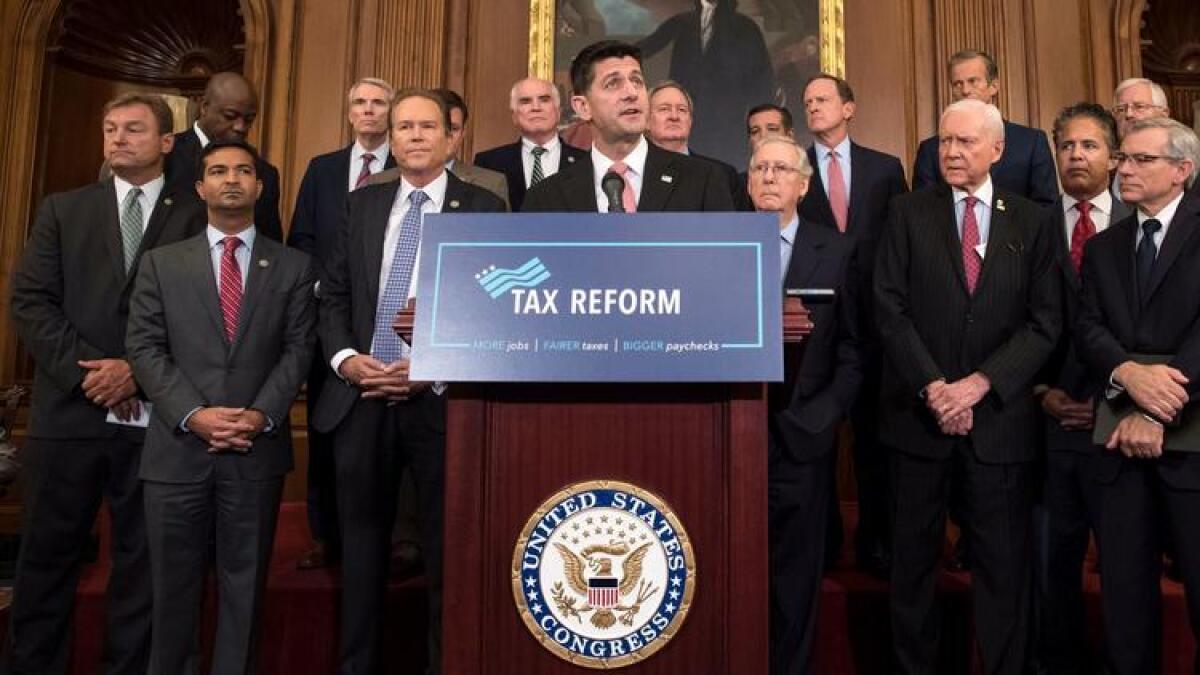
House Speaker Paul D. Ryan said Friday that the Republican tax overhaul will include a fourth bracket for the wealthiest Americans to ensure that high earners don’t benefit more than the middle class.
The bracket would be “designed to make sure we don’t have a big drop in income tax rates for high-income people,” Ryan (R-Wis.), told “CBS This Morning.” Ryan didn’t say what the tax rate or income level would be for the fourth bracket in the Republican plan.
The outline of the tax plan released last month by the White House and top congressional Republicans called for reducing the current seven individual tax brackets to three, with the top rate declining to 35% from 39.6%.
In 2017, the top bracket applied to income of more than $418,400 for individuals and $470,700 for couples filing jointly.
- Share via
As Trump looms, Virginia governor’s race tests whether an establishment Republican can succeed

A decade before Donald Trump upended national politics, Ed Gillespie was among the establishment Republicans counseling his party’s candidates to tread gently on the issue of immigration or risk ruination by alienating Latinos.
Now he is Virginia’s Republican nominee for governor, sounding remarkably like Trump as he speaks from a hay bale-laden stage at the Washington County Fairgrounds in southwest Virginia. The president won 75% of the vote in this part of the state, and Gillespie is trying to prove that an establishment Republican still can succeed under the shadow of Trump.
“Do we need to have sanctuary cities here in Virginia?” Gillespie asked the crowd, raising an issue he has highlighted in ads that feature heavily tattooed Latinos and threats of menacing gangs.
“No, we don’t!” the crowd shouted back, and he added firmly: “No, we don’t.”
- Share via
Video of Frederica Wilson’s 2015 FBI speech shows John Kelly got it wrong
White House Chief of Staff John Kelly, in criticizing Florida Rep. Frederica Wilson, misrepresented a 2015 speech she made at the opening of a new FBI building, an exclusive South Florida Sun Sentinel video of her speech shows.
Kelly made the comments at the White House on Thursday while discussing President Trump’s conversations with the families of four U.S. soldiers killed in an ambush in Niger earlier this month.
Kelly chastized Wilson for listening in on the conversation between Trump and the widow of Sgt. La David Johnson. Wilson was in a car with the widow and Johnson’s mother going to the airport for the arrival of Johnson’s body, and the call was placed on speakerphone.
Kelly then continued his criticism of Wilson, mentioning the 2015 dedication of an FBI building in Miramar, Fla., where he said she focused her speech on asserting that she “got the money” for the building, a sum, he said, of $20 million.
Wilson said Kelly’s comment was a fabrication, that she wasn’t even a member of Congress when the funding for the building was approved. A Sun Sentinel video of the event supports Wilson’s version of events.
Wilson did take credit for securing approval just days before the dedication of naming the building in honor of two slain FBI agents.
- Share via
Trump praises Senate Republicans for passage of budget with $1.5-trillion deficit to pay for his upcoming tax cuts
President Trump praised Senate Republicans — giving an unusually upbeat shout-out to Majority Leader Mitch McConnell — for passage of a GOP budget that sets the stage for tax reform.
Along with Trump’s tweets, the White House issued a statement in which the president “applauds the Senate for passing its FY 2018 Budget Resolution” and “taking an important step in advancing the administration’s pro-growth and pro-jobs legislative agenda.”
The proposed budget adds $1.5 trillion to the deficit over the decade to pay for Trump’s tax cuts. It was approved on an essentially party-line vote, 51-49, late Thursday with one Republican, Sen. Rand Paul of Kentucky, joining all Democrats in opposition.
Paul rejected the party’s argument that a tax-cuts package, which is still a work in progress, will more than pay for itself by spurring economic growth that will produce more revenue.
“I will fight for the biggest, boldest tax cut we can pass, but I could not in good conscience vote for a budget that ignores spending caps,” the libertarian-leaning senator said.
The measure now must be reconciled with a House version.
- Share via
Speaker Ryan roasts Trump: ‘Enough with the applause, all right. You sound like the Cabinet when Donald Trump enters’
House Speaker Paul Ryan took the mike at the annual Alfred E. Smith charity dinner -- and had more than a few zingers. Here are some of the shots he took:
- Share via
Bernie Sanders bows out of Women’s Convention in Detroit to survey Puerto Rico
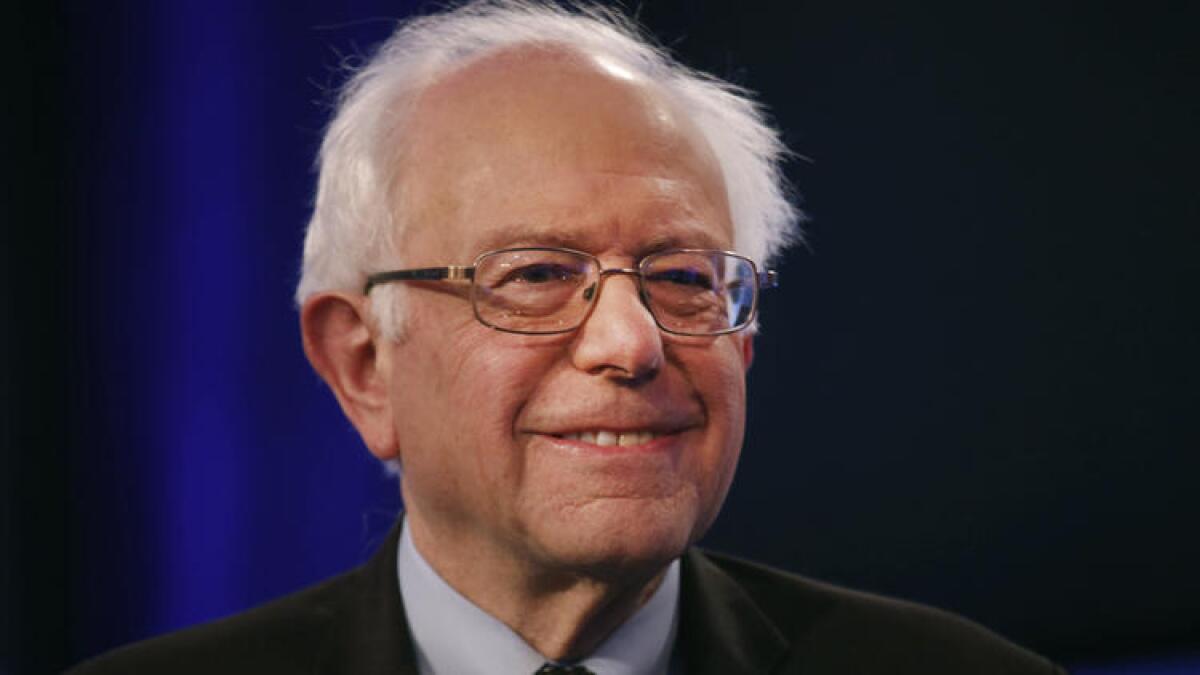
In seven days, Vermont Sen. Bernie Sanders’ role for the Women’s Convention in Detroit went from a primary speaker to a panelist to not attending at all.
Sanders said he can’t attend the event because he’ll be in Puerto Rico to survey the devastating damage from Hurricane Maria, which hit the island about a month ago.
“I want to apologize to the organizers of the Women’s Convention for not being able to attend your conference next Friday,” Sanders said in a statement. “Given the emergency situation in Puerto Rico, I will be traveling there to visit with San Juan Mayor Carmen Yulin Cruz and other officials to determine the best way forward to deal with the devastation the island is experiencing.”
Instead, U.S. Sen. Debbie Stabenow (D-Mich.) will give an opening speech at the convention, which is the first national Women’s Convention in 40 years. U.S. Rep. Maxine Waters (-L.A.) also will speak at the event.
The gathering, scheduled for Oct. 27-29 at Cobo Center, is expected to attract more than 3,000 people and aims to take on social injustice and uphold the feminist nonviolent resistance principles of the Women’s March, which is organizing the event.
- Share via
Listen live: Young, pregnant migrant’s case tests Trump’s policies on abortion and immigration
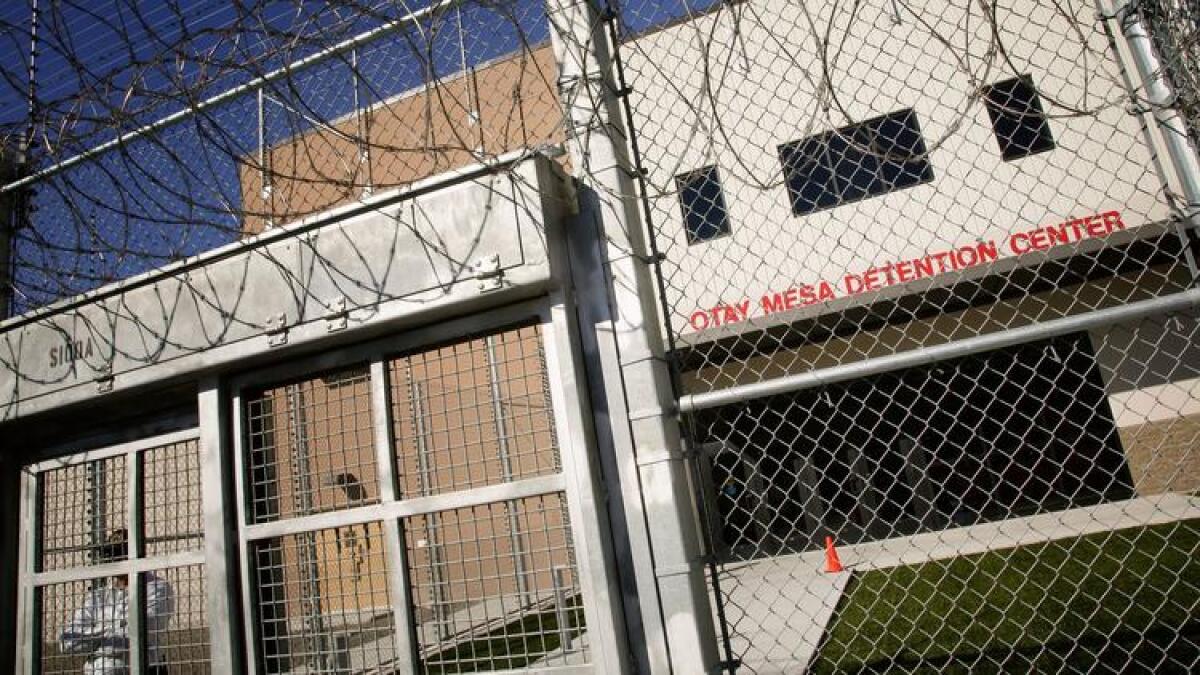
When the Trump administration chose E. Scott Lloyd, a prominent antiabortion activist and attorney, to head the federal agency that oversees refugee affairs, he quickly set about enforcing strict policies.
For months, even as he personally intervened in cases and tried to talk young women out of getting abortions, his efforts drew little attention.
The case of a 17-year-old pregnant girl in an immigration detention center in Texas has suddenly changed that.
On Friday, a federal appellate panel in Washington is scheduled to hear arguments in a case brought by the girl, called Jane Doe to shield her identity, to force Lloyd’s office to allow her to have an abortion. The dispute could be an important early test of both abortion rights and the treatment of immigrants in custody in the Trump era.
Doe was pregnant when she crossed the border in September as an unaccompanied minor. Since then, she has been detained in a shelter in Texas. Lloyd, who has campaigned against abortion since his days as a law student at Catholic University, has denied her requests to leave the shelter to obtain an abortion, according to court papers.
- Share via
Former President Obama steps back onto the campaign stage to spur voters and tangle with Trump
Barack Obama returned to the campaign stage on Thursday to denounce the politics practiced by his successor as president, Donald Trump, as unbefitting a nation yearning for unity rather than division.
Speaking in New Jersey and Virginia on behalf of Democratic candidates for governor in next month’s off-year elections, Obama never mentioned Trump’s name in his first political activities since leaving office.
But his indictment of his replacement — and his defense of his own eight years as president — was by turns angry and somber, and clearly targeted at the White House.
- Share via
In stunning attack, George W. Bush accuses President Trump of promoting falsehoods and prejudice
In an extraordinary — albeit veiled — attack, former President George W. Bush delivered a scathing assessment Thursday of President Trump and his policies, suggesting he has promoted bigotry and falsehoods to the detriment of the country and its values.
Speaking at a policy seminar in New York, the nation’s 43rd president never mentioned Trump by name. But his target was unmistakable.
“We have seen our discourse degraded by casual cruelty,” Bush said. “We’ve seen nationalism distorted into nativism.”
“Bullying and prejudice in our public life sets a national tone, provides permission for cruelty and bigotry, and compromises the moral education of children,” he said at another point. “The only way to pass along civic values is to first live up to them.”
The remarks were an exceptional breach of the protocol governing post-presidential behavior — be seen and rarely heard — and were especially striking coming from Bush. He has gone to great lengths to ignore repeated provocations from Trump, who savaged the former president’s younger brother Jeb in the 2016 campaign and often assailed the Bush administration.
- Share via
Watch live: President Obama speaks at Ralph Northam rally in Virginia
- Share via
Trump meets with Janet Yellen as decision on next Fed chair nears
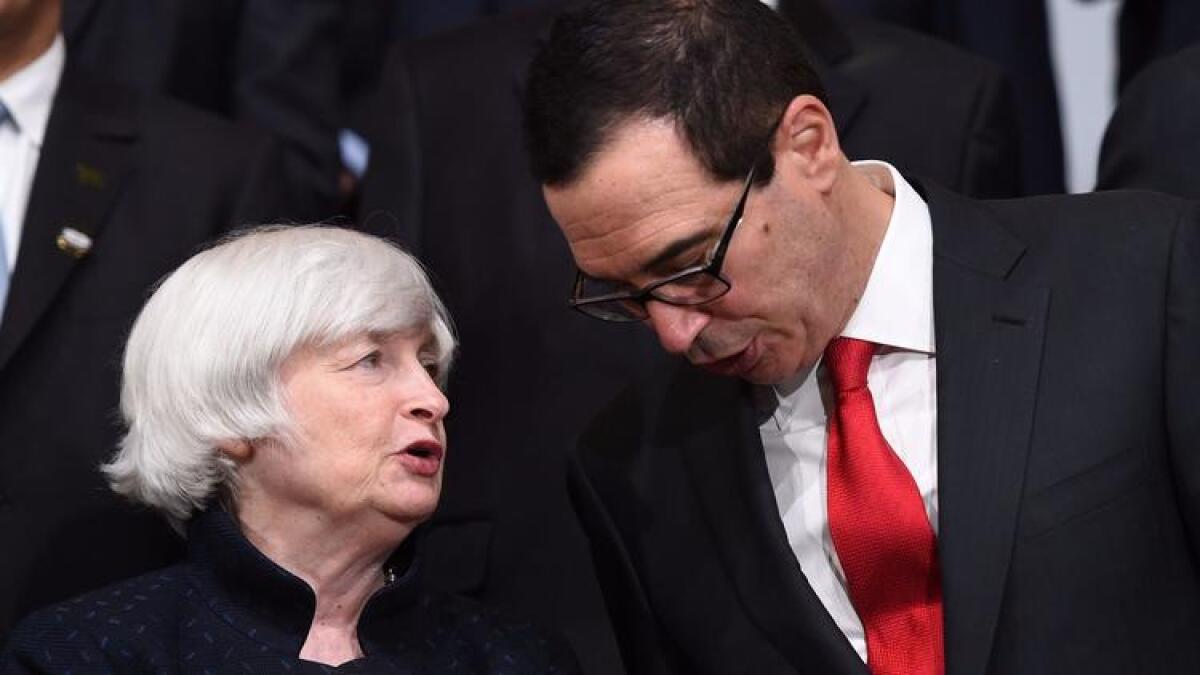
President Trump met with Federal Reserve Chairwoman Janet L. Yellen at the White House on Thursday as he neared a decision on who will lead the central bank after her first four-year term ends in February.
Yellen, 71, a Democrat nominated to the job by former President Obama, is one of five candidates and was the last to meet with Trump, a White House official said.
Trump told reporters this week he was nearing a decision on a job that could have a major influence on his efforts to boost economic growth by reshaping the world’s most powerful central bank.
“I would say within those five you’ll probably get the answer,” Trump said Tuesday. “And I’ll be making the decision over the next fairly short period of time.”
- Share via
Trump will head to Capitol Hill next week for lunch with GOP senators
President Trump is heading to Capitol Hill next week for lunch with Senate Republicans as Congress struggles to push ahead on its next priority -- tax reform.
Trump was invited by the No. 4 Republican leader, Sen. John Barrasso (R-Wyo.), who organizes the weekly lunches.
Barrasso is also among those senators being targeted for a possible primary challenge by Stephen K. Bannon, the former White House advisor who has pledged a “war” on the Republican establishment he views as insufficiently supportive of Trump’s policies.
- Share via
Trump’s chief of staff, who lost a son in combat, gives emotional defense of Trump’s calls to military families
White House Chief of Staff John F. Kelly on Thursday gave an emotional defense of Trump’s calls to the families of soldiers killed earlier this month in Niger, and assailed a Democratic congresswoman who was among the president’s chief critics.
Kelly said he was “stunned” and “broken hearted” to see a member of Congress, Rep. Frederica S. Wilson of Florida, describing Trump’s conversation with the widow of Stg. La David T. Johnson, one of four U.S. soldiers who died in an Oct. 4 ambush in the West Africa country.
Wilson, a friend and mentor to the Johnson family, was with Myeshia Johnson in a car when the widow took Trump’s call, and heard him on a speakerphone. Wilson later described Trump’s message as insensitive for suggesting the sergeant knew what he was getting into when he joined the Army.
In the call to Johnson’s widow, Trump was echoing words that Kelly had suggested, the chief of staff told reporters at the White House. Kelly lost a son in a landmine explosion in Afghanistan in 2010.
Before Trump placed the calls, the president had asked what to say, and Kelly recounted for him what Kelly’s best friend had said when Kelly’s son, Lt. Robert Kelly, had died. The friend said the young man at the moment of his death was doing exactly what he wanted to do, that he knew what he was getting into and that he was surrounded by the “best men on earth” when he died.
“That’s what the president tried to say to four families the other day,” Kelly said. “In his way, he tried to express that.”
- Share via
Senators push forward with bipartisan Obamacare fix — and Trump’s encouragement
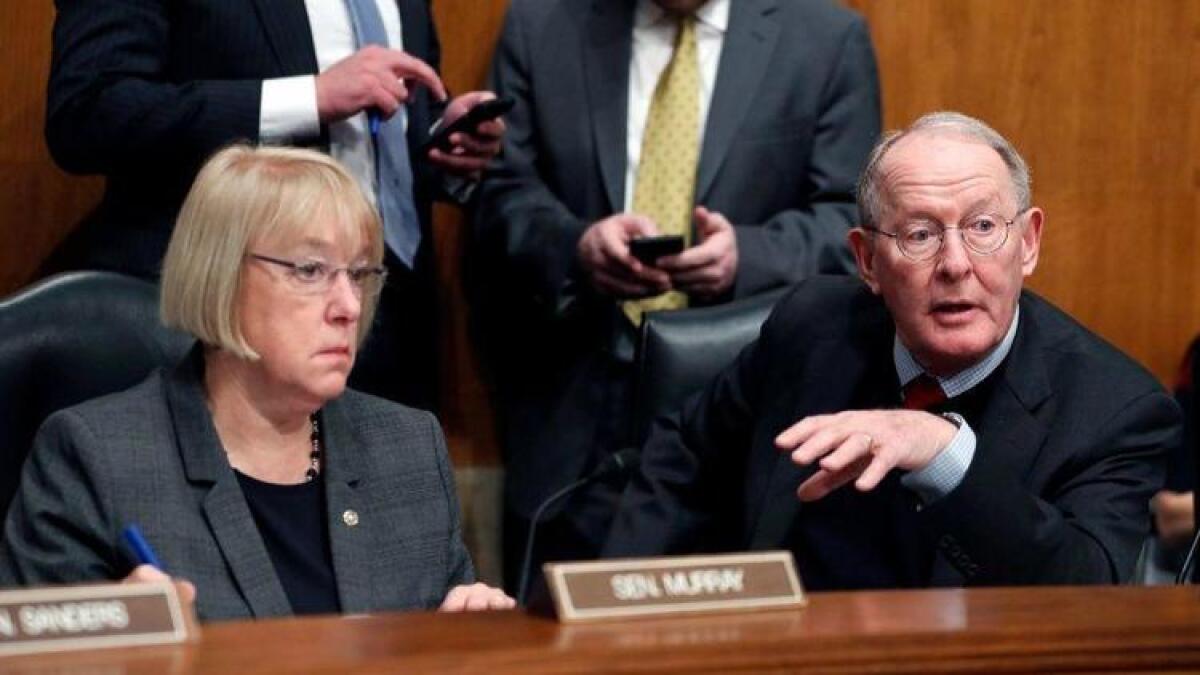
Despite President Trump’s mixed messages, key senators unveiled their bipartisan plan Thursday to stabilize health insurance markets, drawing widespread support.
Sen. Lamar Alexander (R-Tenn.), chairman of the Senate Health committee, and the top Democrat on the panel, and Sen. Patty Murray of Washington jointly announced 22 bipartisan co-sponsors to their effort, more than typical for a bill.
Alexander noted that Trump, too, continued to encourage him to push forward. The president called the senator twice Wednesday, even after speaking critically of the plan.
“I want to thank him for his encouragement,” Alexander said.
Eleven Republican and 11 Democratic senators joined in backing their bill, which would extend for two years federal payments to insurers that offset subsidies they must offer to help low-income Americans. In exchange, Republicans want to make it easier for insurers to offer cheaper plans and those that deviate from certain regulations.
Trump has cut off the payments but told Alexander he would be willing to reinstate them, the senator said.
The compromise also has drawn support from more than two dozen groups representing healthcare advocates, patients and providers.
Among those backing the bill, Sen. Lisa Murkowski (R-Alaska), said she not only supports the policy, but the opportunity it provides for Congress to show, “at a time when things are a little tense ... that we can come together. We can demonstrate the ability to govern.”
- Share via
George W. Bush’s scathing rebuke of the Trump presidency
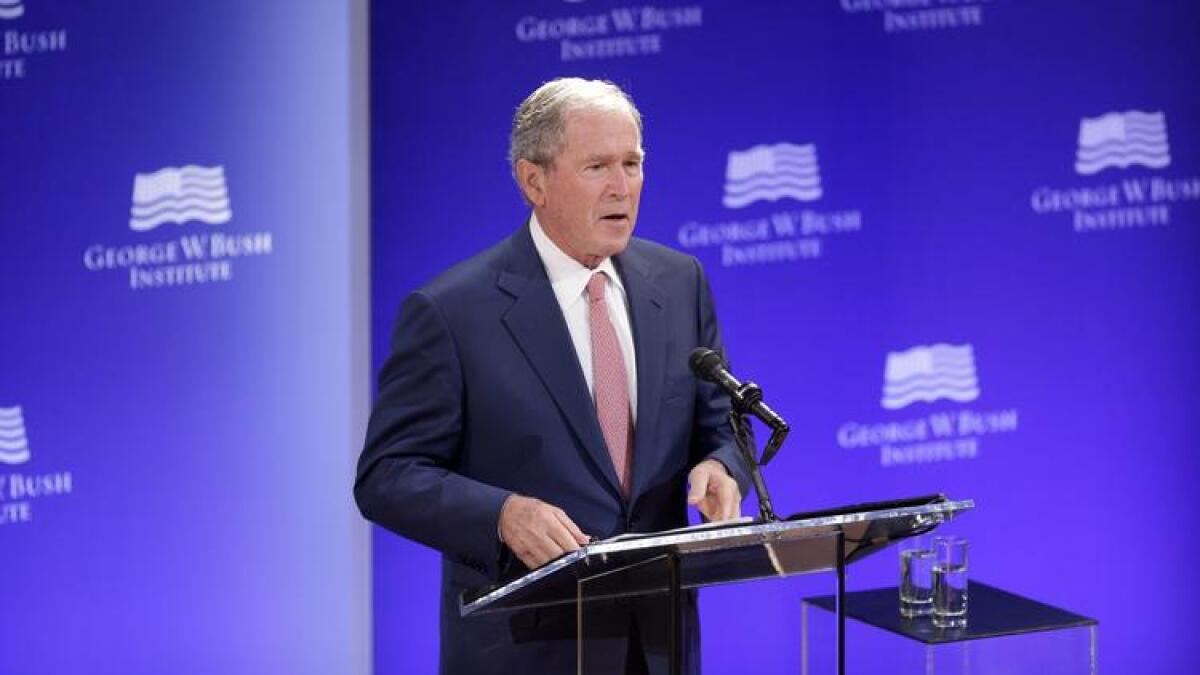
Former President George W. Bush on Thursday delivered a scathing warning about Donald Trump, saying his “America first” philosophy portends a dangerous inward turn that is eroding democracy at home and threatening stability around the world.
“The health of the democratic spirit is at issue,” the 43rd president said during a speech in New York. “And the renewal of that spirit is the urgent task at hand.”
“Since World War II, America has encouraged and benefited from the global advance of the free markets, from the strength of democratic alliance and from the advance of free societies,” Bush said.
“Bullying and prejudice in our public life sets a national tone, provides permission for cruelty and bigotry and compromises the moral education of children.”
- Share via
Senate Democrats fail in first attempt to save state and local tax deduction
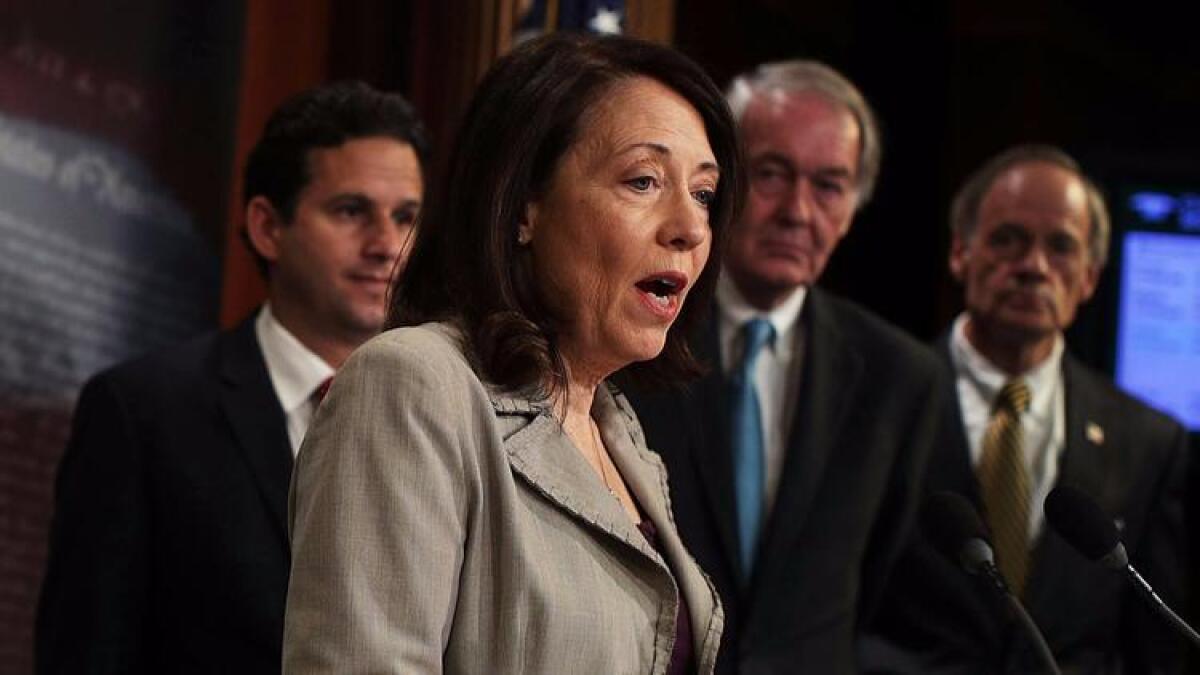
Senate Democrats on Thursday failed in their first attempt to save the state and local tax deduction, which helps many residents of California and other high-cost states reduce their federal income tax bills.
The Republican-controlled Senate voted 52-47 to reject an amendment that would have prevented the Senate from considering any bill that repeals or limits the deduction as part of a planned tax overhaul.
But the fight over the break, which the Republican tax plan would scrap, is far from over as legislative efforts in Congress are just beginning.
And supporters of the deduction seized on a new argument Thursday, noting that the Republican tax overhaul framework does not propose to eliminate the ability of corporations to deduct state and local taxes as a business expense.
- Share via
Trump meets with Puerto Rican governor: ‘I give ourselves a 10’
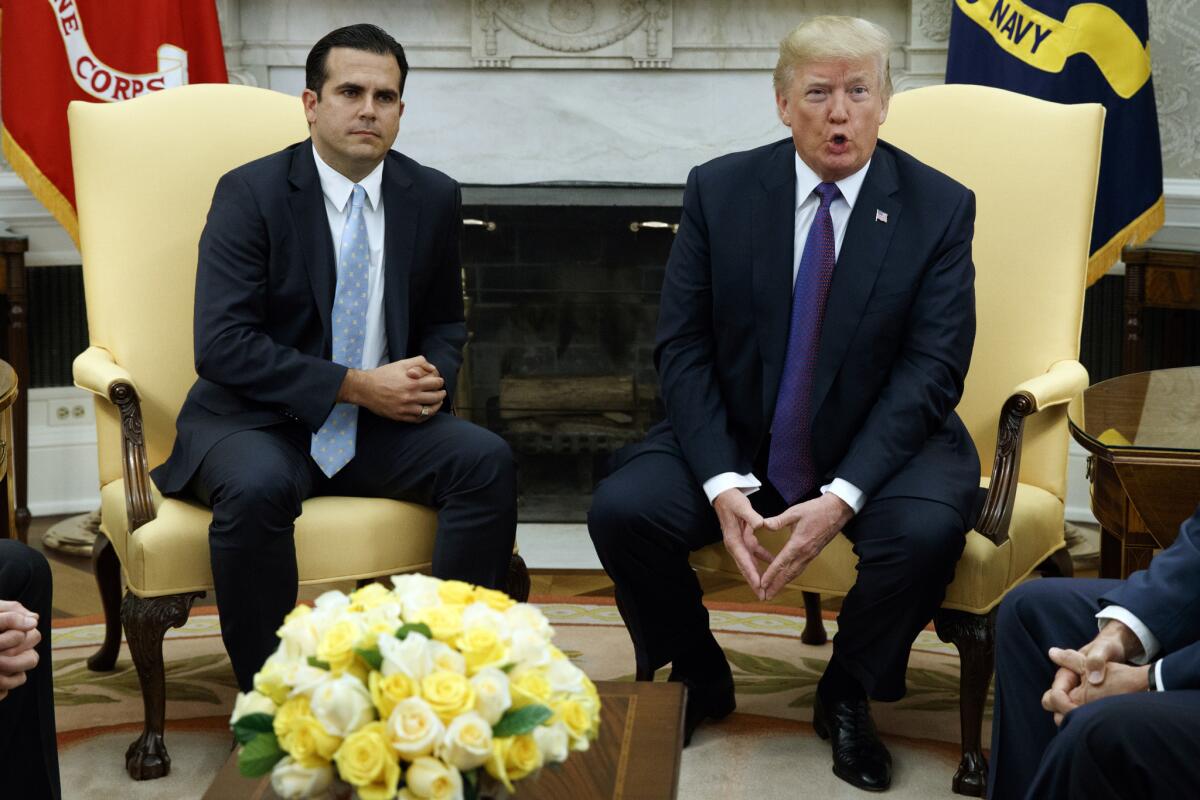
President Trump, still facing criticism for his administration’s response to the pair of hurricanes that ravaged Puerto Rico, gave himself high marks Thursday as he met with the island’s governor, Ricardo Rossello.
“I give ourselves a 10,” Trump said.
At one point, Trump looked directly at Rossello, seated beside him in the Oval Office, and asked: “Did we do a great job?”
Rossello, on a delicate mission to secure aid for the U.S. territory, did not answer directly. “You responded immediately, sir,” Rossello said.
“The response is there,” he added. “Do we need to do a lot more? Of course we do.”
Trump has continually expressed frustration with the blame he has received for the federal government’s response in Puerto Rico, where the majority of residents lack electricity. He blamed the island for many of its problems while warning of the limits of the federal government’s commitment.
Rossello asked for equal treatment with other Americans as he talked about the long task ahead.
Trump praised the government’s “well-oiled machine” in responding to disasters affecting Texas and Florida, while pointing to corruption in Puerto Rico as hampering efforts there. “Not by the federal; this is local we’re talking about,” he added.
He also emphasized Puerto Rico’s large debt, saying that the federal government would expect to have any loans it provides for rebuilding the island paid off before other debt-holders.
- Share via
Trump punts his top priorities to Congress, setting the stage for a year-end showdown
In kicking his top priorities to Congress, President Trump is setting the stage — intentionally or not — for weeks of messy horse-trading that may culminate in a year-end standoff to avoid another government shutdown.
Trump is betting he can pressure Congress into breaking its gridlock and squeeze some concessions from Democrats.
But his own flip-flops on key issues have left lawmakers unable to trust the White House’s leadership and uncertain how to resolve the most thorny policy disputes.
- Share via
Watch live: Trump meets with Puerto Rico Gov. Ricardo Rossello
- Share via
Trump administration tries to block abortion for pregnant undocumented immigrant
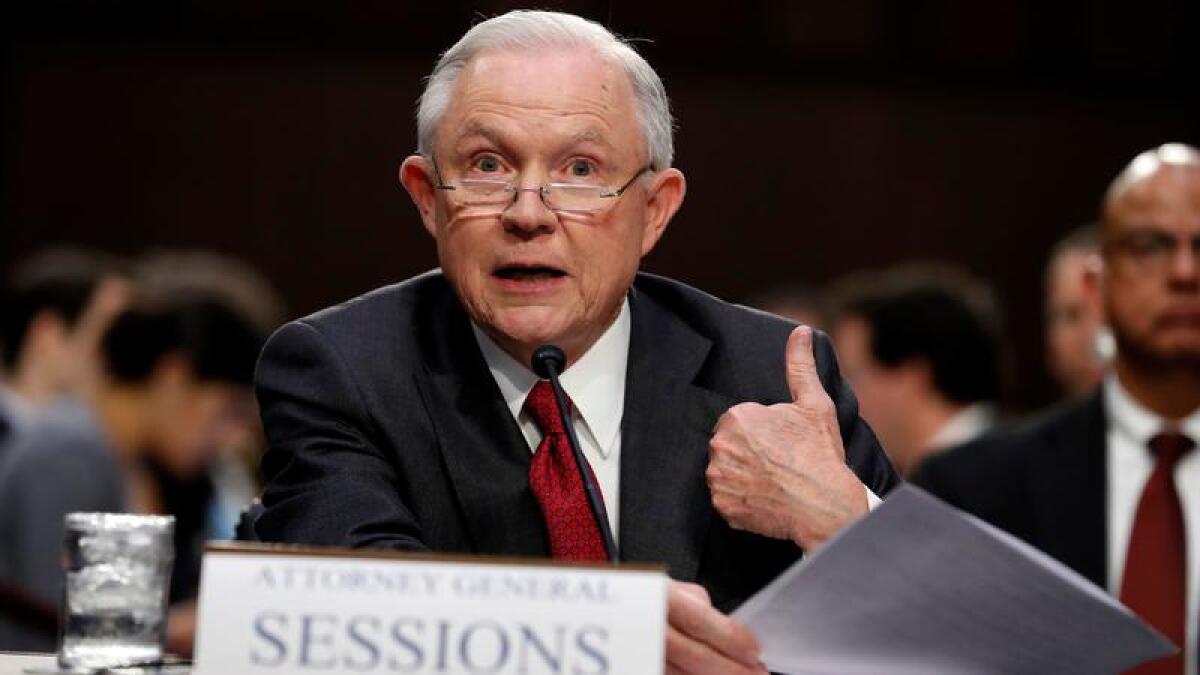
Lawyers for the Trump administration have asked a court for an emergency order allowing officials to block a pregnant 17-year-old immigrant in federal custody from having an abortion.
Thursday morning, the federal appeals court in Washington announced it would hold a hearing in the case on Friday.
The woman, known in court as Jane Doe, has been held in an immigrant detention facility in Texas since being detained after crossing the border in September. Soon after her detention, a medical exam found she was pregnant, and she began seeking an abortion. Although she got approval from a state judge to have the procedure -- a requirement in Texas for minors who do not have a parent’s permission -- federal officials have refused to allow her to leave the detention center to go to a clinic.
Doe won a round in court earlier Wednesday when a federal district judge here ordered the government to allow her to obtain an abortion by Saturday.
But within hours, lawyers for Atty. Gen. Jeff Sessions asked the court of appeals to put that ruling on hold, saying that she could still wait “a number of weeks” to end her pregnancy.
The appeals court, in its order Thursday, stayed part of the lower court order, saying that federal officials must allow Doe to go to the pre-abortion counseling session that Texas requires for minors. But the court put off the Saturday deadline for the abortion, itself, until the judges can consider the case.
The Department of Health and Human Services, which has custody of unaccompanied minors who are apprehended crossing the border, has a policy of not taking any action that would “facilitate” an abortion, government lawyers told the judges in their motion.
The young woman could get an abortion by returning to her home country, Justice Department lawyers said.
“Even if she must choose between leaving the United States and the ability to seek an abortion,” forcing that choice would not violate her rights “because Ms. Doe, as an illegal alien, has no legitimate right to remain in the United States,” they wrote.
Requiring the government to allow her to go to a clinic for an abortion could “incentivize illegal immigration by pregnant minors,” they argued.
Attorneys for the ACLU, which have represented Doe in court, called the government’s move “shocking.”
“We should all be horrified that the federal government is doing everything imaginable to stop a young woman from getting an abortion,” said Brigitte Amiri, senior staff attorney with the ACLU’s Reproductive Freedom Project. “No one should be delayed for weeks in getting the care they need.”
8:48 a.m.: This post was updated with information on the appeals court’s order.
- Share via
Watch live: CIA Director Mike Pompeo and national security advisor Lt. Gen. H.R. McMaster speak at security summit
- Share via
How Trump’s response to four soldiers’ deaths went so wrong
President Trump kept silent on the deaths of four American soldiers for nearly two weeks, while finding time to tweet about “fake news” and Republicans’ fundraising, attack Puerto Ricans and a Republican senator, among others, and keep up his complaints against protesting professional football players.
When he finally spoke up on Monday about the deadliest combat incident of his presidency — and then only in answer to a reporter’s question — Trump started a furor that engulfed his chief of staff, predecessors from both parties, a Florida congresswoman and now one of the grieving families of the soldiers he was being asked to honor.
Trump’s slow and sloppy response to the death of the soldiers ambushed Oct. 4 in Niger, in northern Africa, illustrated the hazards of his extemporaneous governing style, the disorganization within his White House and his refusal to back down in the face of criticism.
“It’s exactly the wrong way to handle this kind of situation,” said Leon E. Panetta, who served as Defense secretary under President Obama and White House chief of staff for President Clinton.
Aside from his public battle with a Democratic congresswoman from Florida and the mother of the fallen soldier, Army Sgt. La David T. Johnson, over the alleged insensitivity of his condolence call the day before, the Washington Post reported that Trump promised Chris Baldridge of Zebulon, N.C., $25,000 of his own money when they spoke in the summer about the loss of his son, Army Sgt. Dillon Baldridge, killed in Afghanistan. The check never came. The White House said Wednesday, after the report, that “the check has been sent.”
The Associated Press reached out to the families of all 43 people who have died in military service since Trump became president and made contact with about half the families. Of those who would address the question, relatives of nine said they had heard from Trump by phone or mail. Relatives of nine others said they haven’t. Others waited for calls that did not come.
Read MoreTimeline: A deadly ambush in Niger, and quiet in Washington — until now
The Associated Press contributed to this report.
- Share via
Judge rules detained teenage immigrant must be allowed to have an abortion

The Trump administration must stop blocking a pregnant teenage immigrant currently being held in custody in Texas from getting an abortion, a federal judge ruled Wednesday.
Administration officials have been refusing to allow the 17-year-old, known in court as Jane Doe, to travel to an abortion clinic from the shelter for unaccompanied immigrant minors where she is being held.
Lawyers for the ACLU, which went to court on Jane Doe’s behalf, said that officials of the Office of Refugee Resettlement, part of the department of Health and Human Services, had taken the woman to a Christian group that counsels pregnant women not to have abortions, but had refused to give her permission to travel to the clinic.
At a hearing Wednesday, a lawyer for Atty. Gen. Jeff Sessions had suggested that because the woman was not legally a U.S. resident, she was not covered by the constitutional right to end her pregnancy.
U.S. District Judge Tanya S. Chutkan rebuked the government lawyers at the hearing. Her order directs officials to transport Jane Doe to the clinic of her choice and allow her to obtain an abortion by Saturday.
“At last, our client will be able to get the care she needs without federal officials standing in the way,” Brigitte Amiri, senior staff attorney with the ACLU Reproductive Freedom Project, said in a statement.
“Her courage and perseverance are incredible, but no one should have to go to court to get a safe, legal abortion. And no one should be held hostage to the extreme anti-abortion views of a handful of government officials.”
A spokesman for the Department of Health and Human Services said lawyers were reviewing the ruling and considering how to respond.
The judge’s “troubling ruling” sets a “dangerous precedent” that could lead to the U.S. becoming an “open sanctuary for taxpayer-supported abortions by minors crossing the border illegally,” the department said in a statement.
The Justice Department declined to comment on the ruling.
3:01 p.m.: This post was updated with the Justice Department declining to comment.
4:06 p.m.: This post was updated with a statement from the Department of Health and Human Services.
- Share via
Mnuchin warns of ‘significant’ stock market drop if tax reform fails
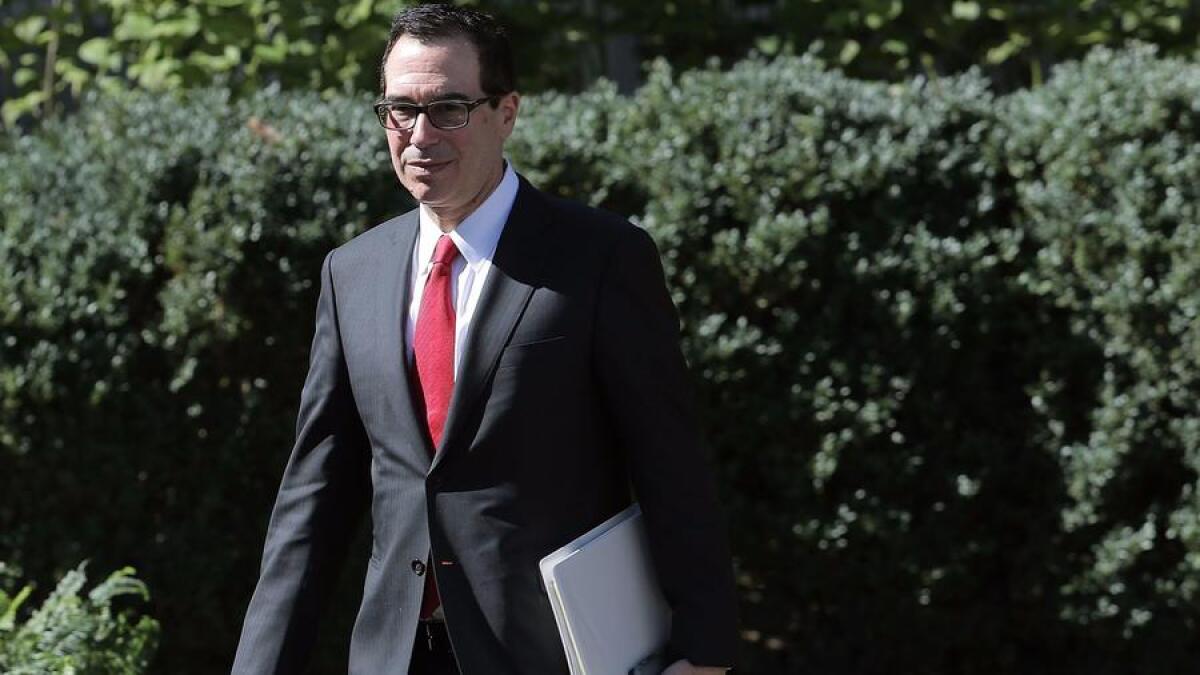
Treasury Secretary Steven T. Mnuchin said Tuesday that failure to pass the Republican tax overhaul would trigger a “significant” drop in the stock market, which has rallied to record highs in recent months.
His warning, which some market analysts disputed, came as a new poll showed 52% of Americans oppose the tax plan, which is centered on huge cuts for corporations.
Only a third of respondents in the CNN poll said they supported the proposal from the Trump administration and congressional Republican leaders, which lawmakers are scrambling to turn into legislation.
With Congress facing a difficult task in passing a tax bill by the end of the year, Mnuchin increased the stakes by saying the recent stock market rally would end if the effort fails.
- Share via
Tillerson uses speech on ‘partner’ India to take jab at China
Ahead of his first trip to India, Secretary of State Rex Tillerson on Wednesday used a speech about the world’s largest democracy to take a jab at the Pacific region’s other powerhouse, China.
Tillerson heaped praise on India’s vibrant growth and declared the United States its partner.
He also commended India for respecting international norms of trade and commerce as it challenges China’s economic power.
Although the United States wants continued dialogue with Beijing, Tillerson said, “we won’t shrink from China’s challenges to the rules-based order, or where China subverts the sovereignty of neighboring countries, and disadvantages the U.S. and our friends.”
“In this period of uncertainty and angst, India needs a reliable partner on the world stage,” he said. “The United States is that partner.”
Tillerson travels in the coming days to India and other countries in the region, pushing what the State Department describes as the administration’s new policy for a “free and open Indo-Pacific” region, including Afghanistan.
- Share via
Trump continues spat with congresswoman over his call to soldier’s widow: ‘I did not say what she said’
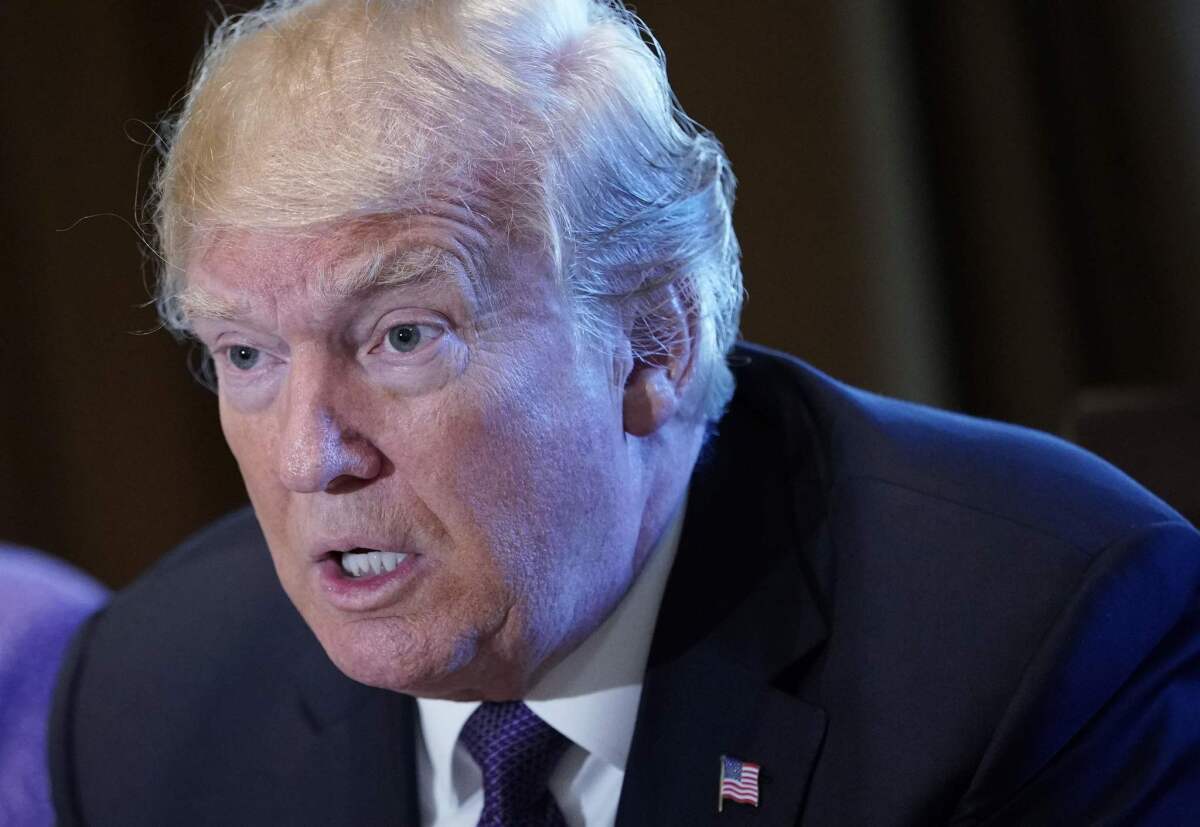
President Trump pushed back harder on Wednesday against a congresswoman’s account of his phone call to the widow of a slain soldier, saying Rep. Frederica S. Wilson knows she falsely reported his comments.
“I didn’t say what that congresswoman said, didn’t say it at all. She knows it,” Trump told reporters gathered for the start of his meeting with members of the Senate Finance Committee about his proposed tax cuts.
Trump angrily added a challenge, “I’d like her to make that statement again,” and moments later repeated it.
Wilson, a Florida Democrat, has said she was with the widow of Staff Sgt. La David T. Johnson, one of four soldiers killed in Niger after an ambush on Oct. 4, and listening by speakerphone when Trump called to offer condolences on Tuesday. Wilson, who knew Johnson, said the president told Myeshia Johnson that her husband “must have known what he signed up for.”
Johnson’s mother, Cowanda Jones-Johnson, confirmed Wilson’s account to the Washington Post.
Trump had not commented on the four soldiers’ killings until Monday, when he was asked by reporters why he hadn’t done so in nearly two weeks. The president defensively claimed to have done a better job of contacting families of slain service members than Presidents Obama and George W. Bush. Former staff members from both administrations have disputed Trump, some of them angrily.
- Share via
Senators announce bipartisan deal to stabilize Obamacare markets

The Senate moved closer Tuesday to a rare bipartisan deal to fix parts of the Affordable Care Act as a pair of leading senators announced an agreement designed to stabilize health insurance markets.
The deal — which was blessed by President Trump — still faces significant hurdles in Congress, particularly opposition from some conservative Republicans who want nothing less than a complete repeal of the 2010 healthcare law, commonly called Obamacare.
But the announcement of the compromise worked out by Senate Health Committee Chairman Lamar Alexander, a Republican from Tennessee, and the committee’s senior Democrat, Sen. Patty Murray of Washington, nonetheless marks an important breakthrough in the nation’s more than seven-year battle over the healthcare law.
- Share via
Trump reverses course and appears to reject senators’ bipartisan Obamacare fix
A day after President Trump gave his blessing to a short-term fix to stabilize the insurance market under the Affordable Care Act, he appeared to backtrack with pointed criticism Wednesday of the deal.
Trump singled out the chief negotiator of the accord, Sen. Lamar Alexander (R-Tenn.), the affable chairman of the Senate Health Committee, who negotiated the two-year agreement with the panel’s top Democrat, Sen. Patty Murray of Washington.
For the past two days Trump has spoken publicly about the need for a temporary measure to curb rising premiums. Prices are expected to spike after Trump announced his decision to eliminate some federal subsidies to insurers under Obamacare.
The senators’ deal would allow those payments to continue, in exchange for loosening restrictions to allow for cheaper, less generous policies in certain case.
Many conservative Republicans oppose the compromise and would prefer to repeal the 2010 law.
- Share via
Watch live: Atty. Gen. Jeff Sessions testifies before Senate Judiciary Committee
- Share via
Trump again attacks Comey and Justice Dept. as Sessions goes to testify on Capitol Hill
President Trump sent a series of new tweets renewing his war with the Justice Department and former FBI Director James B. Comey, as Justice’s chief, Atty. Gen. Jeff Sessions, prepared to testify to Congress on Wednesday.
Once again accusing Comey of prematurely exonerating Hillary Clinton, his former rival, before the FBI had completed last year’s probe of her email practices, Trump wrote, “Obviously a fix. Where is the Justice Department?”
Sessions, a campaign confidant of Trump who, in office, has been repeatedly and publicly criticized by the president, is scheduled to testify at a Senate Judiciary Committee hearing, where one topic could be the investigations into whether the Trump campaign assisted Russia’s meddling in the 2016 election campaign.
Trump advisors initially said he fired Comey in May because the FBI director was unfairly harsh to Clinton in the email probe; Trump soon contradicted them, saying he took action because of the FBI investigation of the Trump campaign’s involvement with Russia.
Contrary to Trump’s latest tweets, Hillary Clinton was interviewed by the FBI for more than three hours.
Trump’s tweets seize on newly released FBI documents that show Comey began circulating early drafts of his July 2016 statement recommending no charges against Clinton two months before he delivered it in public. The documents are mostly redacted so it is unclear what is written in the early drafts of the statement.
- Share via
Former press secretary Sean Spicer is questioned in Mueller Russia probe
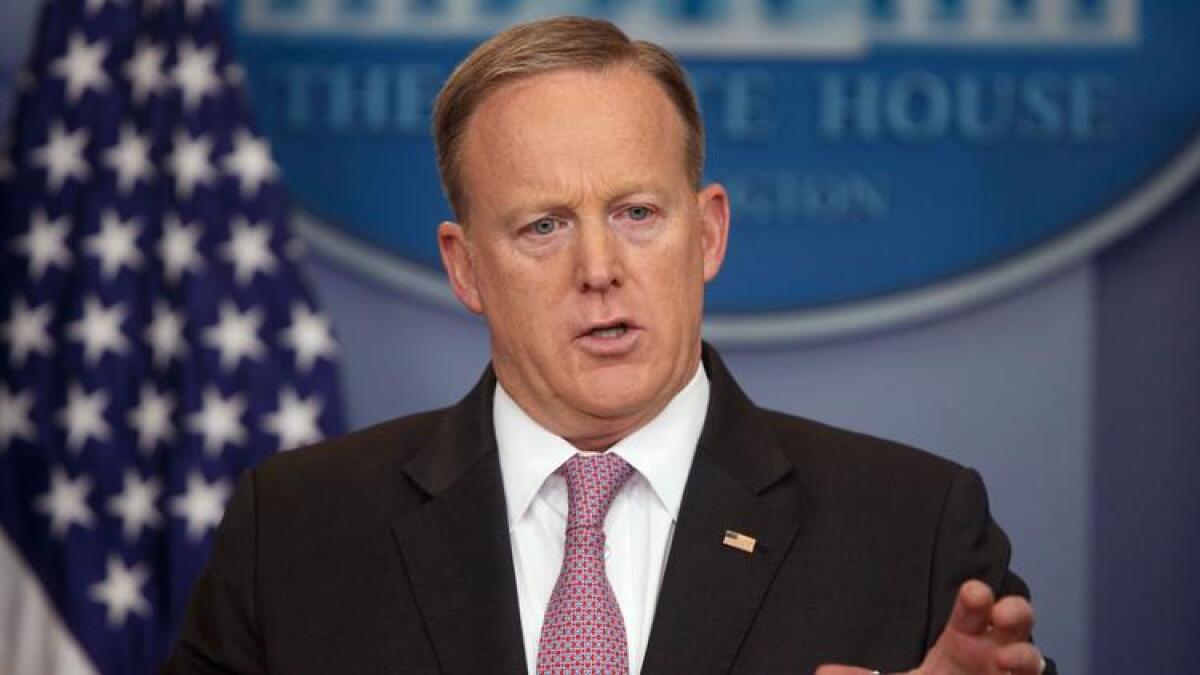
President Trump’s former press secretary, Sean Spicer, was interviewed Monday by special counsel Robert Mueller’s team, according to two people familiar with the matter.
Mueller is investigating Russian interference in the 2016 presidential election and whether there was any collusion between Trump’s campaign and Vladimir Putin’s government. Among the events Mueller is examining is Trump’s firing of former FBI director James B. Comey in May and former national security advisor Michael Flynn, both of which occurred while Spicer was press secretary.
Spicer left the White House at the end of August after his main ally in the White House, Chief of Staff Reince Priebus, was forced out in an internal power struggle. Priebus was interviewed by Mueller’s team on Friday.
Spicer’s interview with the special prosecutor’s team was reported earlier by Politico.
Mueller team’s meeting with Spicer suggests the special prosecutor is ramping up interviews with the Trump White House inner circle.
Mueller’s team also has interviewed Keith Kellogg, the chief of staff of the National Security Council under both Flynn and his successor, said two people familiar with the matter. Kellogg, a retired Army lieutenant general, didn’t bring an attorney to the interview, said one of the people.
In addition to Priebus and Spicer, Mueller is expected to interview White House counsel Don McGahn; James Burnham, an associate in the White House counsel’s office; communications director Hope Hicks and possibly Josh Raffel, a spokesman for Trump’s son-in-law and advisor Jared Kushner, a person familiar with the investigation said last month.
- Share via
Trump blasts congresswoman’s claim that he told soldier’s widow ‘he knew what he signed up for’; lawmaker pushes back
After facing criticism for not calling the families of four soldiers who died in combat, President Trump reached out to one of the widows Tuesday and said her husband “knew what he signed up for ... but when it happens it hurts anyway,” according to Rep. Frederica Wilson (D-Fla.).
The call between Trump and Myeshia Johnson, the widow of Army Sgt. La David Johnson, lasted about five minutes, according to accounts that Wilson provided to local media.
Wilson, a friend of the family, was in the car for the call, which happened before the fallen soldier’s remains arrived at Miami International Airport.
“Yes, he said it,” Wilson told the media. “It’s so insensitive.”
Trump’s silence on the deaths of the soldiers, who were killed in combat in Niger on Oct. 6, generated controversy on Monday. When he was asked why he had not commented on their deaths, Trump responded by saying that President Obama and other presidents also had failed to reach out to families of servicemen killed in action.
That comment drew rebukes from former Obama staffers, who noted the many times that Obama had called family members of soldiers killed in action. Alyssa Mastromonaco, a deputy chief of staff for Obama, tweeted that it was a lie.
“He’s a deranged animal,” she said of Trump.
On Tuesday, Trump brought Gen. John F. Kelly, his chief of staff, into the controversy, saying Kelly hadn’t received a call from Obama when his son, 2nd Lt. Robert M. Kelly, 29, died in combat in 2010.
“As far as other presidents, I don’t know, you could ask Gen. Kelly, did he get a call from Obama? I don’t know what Obama’s policy was,” Trump said in an interview on Fox News Radio.
A White House official who demanded anonymity said that Obama did not call Kelly after the death. The official did not immediately say whether Kelly received a letter.
On Wednesday morning, Trump responded to the claims on Twitter, saying Wilson “totally fabricated” the story.
In an interview Wednesday morning with CNN, Wilson said several other people who were in the car also heard Trump’s remark. “I have proof too,” she said. “This man is a sick man.”
Staff writer Noah Bierman contributed to this report.
--
UPDATES
Oct. 18, 5:33 a.m.: This post was updated to add later comments from Wilson.
Oct. 18, 4:51 a.m.: This post was updated to add Trump’s response
- Share via
Senators announce bipartisan healthcare deal; Trump appears to endorse plan
Key senators announced a bipartisan deal Tuesday to fix parts of the nation’s healthcare law and head off large premium increases faced by consumers in some states.
Sen. Lamar Alexander (R-Tenn.), chairman of the Senate Health Committee, announced the tentative agreement with the top Democrat on the panel, Sen. Patty Murray (D-Wash.).
The agreement would continue cost-sharing payments to health insurers that President Trump eliminated last week.
“President Trump has encouraged this,” Alexander told reporters.
Trump, at a news conference with Greek Prime Minister Alexis Tsipras, appeared to endorse the deal: “We have been involved, and this is a short-term deal,” he said, adding that it would last for “the next year or two” so that “we don’t have this dangerous little period.”
Alexander said he spoke to the president twice recently, including Saturday, when Trump encouraged him to find a bipartisan solution.
“He said he doesn’t want people to be hurt during these next two years by the possibility of rising premiums or by not being able to buy insurance,” Alexander said.
Alexander and Murray have been working for months on a proposal that would allow the Obamacare payments to insurers, which help offset costs for low-income Americans, to continue. In return, Congress would make changes to allow states greater ability to waive certain insurer policy requirements to allow for cheaper plans. Specific legislation is expected to be introduced later this week.